Sharif on Friday sensitizing the world about the devastating super floods said that Pakistan’s treasury and people were paying the dual cost of climate injustice, high global warming and inaction despite emitting less than 1% of greenhouse gases.
“It is high time we took a pause from the preoccupations of the 20th century to return to the challenges of the 21st. The entire definition of national security has changed today, and
unless the leaders of the world come together to act now behind minimum agreed agenda, there will be no earth to fight wars over. Nature will be fighting back, and for that humanity is no match”, the Prime Minister said while addressing 77th session of the UN general Assembly.
“As I stand here today to tell the story of my country, Pakistan, my heart and mind have not been able to leave home. No words can describe the shock we are living through or how the face of the country lies transformed.”
“I have come here to explain first hand, the scale and magnitude of this climate catastrophe that has pushed one-third of my country under water in a super storm that no
one has seen in living memory,” he added.
The Prime Minister said that for 40 days and 40 nights a biblical flood poured down on us, smashing centuries of weather records, challenging everything we knew about disaster, and how to manage it. “Even today, huge swathes of the country are still under-water, submerged in an ocean of human suffering. In this ground zero of climate change, 33 million people, including women and children are now at high risk from health hazards, with 650,000 women giving birth in makeshift tarpaulins.”
“More than 1500 of my people have perished in the great flood, including over 400 children. Far more are in peril from disease and malnutrition. As we speak, millions of climate migrants are still looking for dry land to pitch their tents on, with heart-breaking losses to their families, their futures and their livelihoods,” he added. The Prime Minister said the early estimates suggested that more than 13000 kms of metalled roads have been damaged, over 370 bridges have been swept away, a million homes have been destroyed and another million damaged.
“More than a million farm animals have been killed. Four Million acres of crops have been washed away, stripping the people of their breadbasket, and damage of an unimaginable scale,” he added.
The prime minister told the world body that Pakistan’s urgent priority right was to ensure rapid economic growth and lift millions out of destitution and hunger. To enable any such policy momentum, Pakistan needed a stable external environment, he added. PAyiNG cost for GlobAl iNActioN TO OF AFgHANS LEFT WITHOUT FUNCTIONAL ECONOMy & BANKINg SySTEM
Nawaz seeks acquittal in NAB reference under new laws
Former prime minister and PMLN supremo Nawaz Sharif on Friday filed a petition in an accountability court in Lahore challenging the court decision to declare him proclaimed offender in a plot allotment case and sought his acquittal.
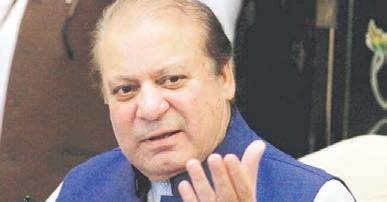
The former premier who is currently living in the United Kingdom on medical grounds has sought relief from the court under the NAB (Amendment) Ordinance, 2022.
His lawyer Qazi Sabah Advocate also pleaded with the court
to exonerate Nawaz Sharif under the amended NAB Ordinance.
The lawyer also filed a petition
seeking Nawaz’s acquittal.
Qazi Sabah argued that under the new NAB ordinance,
the National Accountability Bureau could not initiate an investigation into a case involving corruption less than Rs500 million and his client was facing a reference in which he was accused of committing corruption to the tune of Rs130 million.
He said that the court had ordered to confiscate Nawaz’ property after declaring him proclaimed offender.
He beseeched the court to rescind the case against the PMLN supremo, besides ordering to restore his confiscated property and issue order for his acquittal in the reference.
Eurobonds slump amidst debt relief confusion
KARACHI ariba shahid
Pakistan’s dollar bonds, or Eurobonds, slumped internationally on Friday as Prime Minister Shehbaz Sharif went on record stating that Pakistan needs debt relief.
According to details, the Eurobond yielding 5.625 per cent dropped 11 cents to trade at 81.9 cents on the dollar, whereas the 7.375 per cent Eurobond dropped 7 cents and traded at 40.33 cents on the dollar. However, no major change was witnessed in Credit Default Swap.
Sharif’s statement sent the market into a whirlwind. Within minutes, Finance Minister Miftah Ismail had to step in to control the frenzy. He stated that Pakistan is seeking debt relief from bilateral creditors and not commercial bondholders.
As per Ismail, Pakistan is set to repay the $1 billion sovereign bond due in December. However, friendly countries have given their word to roll over Pakistan’s debt. Pakistan is seeking debt relief from The Paris Club’s bilateral creditor countries.
The minister stated that Pakistan does not need, nor is it seeking any relief on commercial bank debt or Eurobond debt.
“Since it is a thinly traded market, some selling pressure on Pak dollar bonds could have resulted in a sharp price fall, we believe,” said Umair Naseer of Topline Securities while speaking to Profit.
“However, expected multilateral and bilateral flows post floods are also likely to support pressure on foreign exchange reserves of the country. According to news reports, the World Bank, Asian Development Bank (ADB),

Asian Infrastructure Bank, and a few friendly countries have already committed flood-related aid/funding which could be to the tune of $1.5-2bn,” Naseer added.
WhAt ArE EuroBoNDS?

Eurobonds are a debt instrument that allows the issuer to raise money through debt. These are different from regular bonds because they are issued in a currency other than the home currency of the country or market in which it is issued.
They are issued so that the issuer, in this case, the government, can raise capital whilst maintaining flexibility to issue them in another currency. Just because the name has ‘Euro’ in it does not mean the government is issuing bonds in Europe. They are also called external bonds.
In local terms, PIBs are rupee-de-
ISLAmAbAD staff report
Former finance minister Ishaq Dar has decided to return to Pakistan before October 7, confirming that he will probably be in Pakistan next weekend.
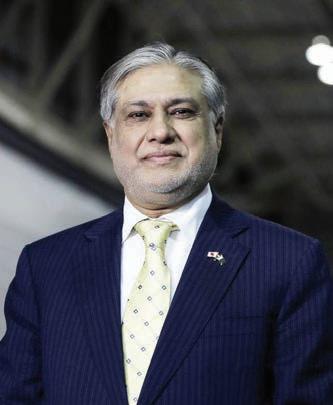
He said that he will take oath as a Senator immediately after his return.
Addressing rumours regarding him replacing Finance Minister Miftah Ismail, he said: “I will perform whatever duty is assigned to me by [PML-N supremo] Nawaz Sharif and Prime Minister Shehbaz Sharif.”
He revealed that Shehbaz will return to London after attending the United Nations general Assembly summit being held in New york. “I will adhere to whatever is decided after consultations with Shehbaz and Nawaz,” he maintained.
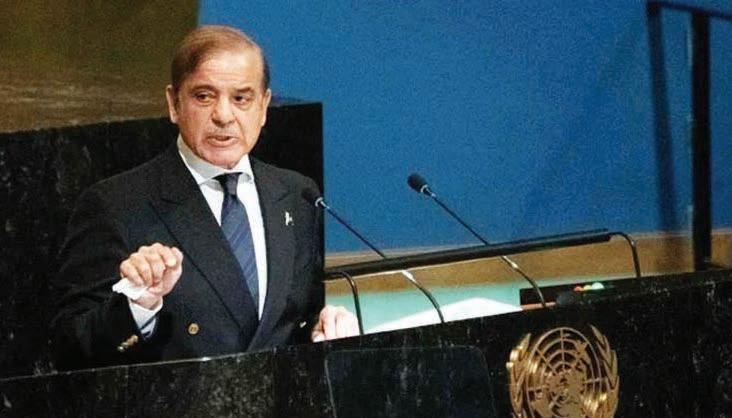
Earlier today, an accountability court in the federal capital suspended the arrest warrants of the former finance minister till October 7 in a case pertaining to him being a proclaimed offender.
Commenting on the court’s decision, he said that he will have to return before that.
Accountability court judge Mohammad Bashir issued the orders today and directed the authorities to not arrest the ex-federal minister — who is currently in London — upon his arrival in Pakistan.
The judge said that once Dar returns to Pakistan, the court will see whether it should revoke his arrest orders or not.
“The arrest warrants will be permanently suspended once Dar appears before the court in person,” the judge said.
The politician moved to accountability court on Thursday after the Supreme Court dismissed Dar’s appeal in a corruption case following his decision to withdraw the plea.
In 2017, an accountability court, while hearing a corruption reference against Dar, declared him a proclaimed offender due to his continued absence from the proceedings.
UNITED NATIONS app
PRIMEMinister Muhammad Shehbaz
nominated and floated in the onshore market, meaning Pakistan. Eurobonds are offshore in nature and in this case, are dollar-denominated.
LAHORE
staff report
Ishaq Dar likely to return next week; will take oath as Senator
PM tells UNGA PAkistAN
doUble
Saturday, 24 September, 2022 I 27 Safar, 1444 I rs 15.00 I Vol XIII No 86 I 12 Pages I Lahore Edition g LINKS SUSTAINABLE PEACE, STABILITy IN SOUTH ASIA
SOLUTION
JAMMU & KASHMIR DISPUTE g REgRETS 30M
CONTINUED ON PAGE 05
PM, US PreSIDenT HAD ‘ConSTrUCTIve’ MeeTIng: MS KHAr
NEW YORK Staff RepoRt
PRIMEMinister Shehbaz Sharif had a brief “interaction” with US President Joe Biden at a reception the US leader hosted for the world leaders gathered in New York for the 77th session of UN General Assembly, Minister of State for Foreign Affairs, Hina Rabbani Khar said.
Responding to reporters’ questions at UN Headquarters in New York, Hina Khar described the conversation as “constructive and forward-looking.”
The Pakistan-US relationship, the state minister added, was starting at a “solid footing and we don’t want to rush it.”
The minister said there was lot of sympathy and goodwill among world leaders for the flood-devastated Pakistan and now that must be converted into something concrete for the country to recover from the disaster, and build back better. “We have fully briefed the international community about the extent of damage wrought by the climate-induced floods”, she added.
Earlier, Shehbaz Sharif on Thursday expressed his gratitude to US President Joe Biden for highlighting the need for urgent action in the wake of massive floods in Pakistan. “Thank you President Joe Biden for highlighting the plight of the flood victims in Pakistan and urging the world for an immediate response, as my country is facing the ravages of unprecedented floods,”
CTD kills two alleged terrorists in Khuzdar
QUETTA Staff RepoRt
The Counter-Terrorism Department (CTD) killed two alleged terrorists said to be associated with a proscribed outfit in Balochistan’s Khuzdar on Friday. A spokesperson for the Counter-Terrorism Department said the operation was conducted in Sorgar area. Two terrorists were killed in an exchange of fire with the Counter-Terrorism Department personnel, while three of their accomplices fled, he added. The terrorists were associated with a proscribed organiszation. Explosives, arms and ammunition were seized from the possession of the killed terrorists.
Ayaz Amir’s son bludgeons wife to death
ISLAMABAD
Staff RepoRt
A cruel man, identified as son of renowned journalist Ayaz Amir, murdered his wife with repeated blows of gym dumbbell in Chak Shahzad of Islamabad on Friday. Accused Shahnawaz, son of renowned journalist Ayaz Amir, used his gym dumbbell to strike his 37-year-old wife Sara Bibi in the head with repeated blows, sources in police said. Police rushed to the crime scene after receiving information and started their investigation. The police have arrested Shahnawaz and shifted the dead body of his wife to Polyclinic Hospital for post-mortem.
he posted on his Twitter handle.

The prime minister stressed that the calls of stranded women and children for help need to be heeded to at international level.
In another tweet, he said, on the second day of UN General Assembly, his discussions with top officials of International Monetary Fund (IMF) and World Bank focused on making resources available within the country’s existing programmes for post-flood reconstruction. “In my other meetings with world leaders, we discussed floods, climate change and rehabilitation of flood victims,” he said. un chief says PaKistan Deserves massive suPPort: United Nations Secretary-General António Guterres has vowed to do everything
possible to mobilize international support and assistance for the flood affected people in Pakistan.
He was talking to Prime Minister Shehbaz Sharif during a meeting on the sidelines of the 77th session of the UN General Assembly in New York.
The UN chief said Pakistan deserves full and massive support from international community to deal with the aftermaths of the devastating floods. The Prime Minister appreciated the Secretary-General’s timely visit and affirming strong solidarity with Pakistan in the wake of the climate-induced catastrophic floods.
Pm, JaPanese counterPart Discuss bilateral ties: Prime Minister Shehbaz Sharif Thursday here held
Sindh seeks Punjab’s help to tackle spread of diseases
KARACHI Staff RepoRt
Amid the rise in spread of diseases in flood-hit areas, the Sindh government has sought help from Punjab on Friday.
As per the official sources, the Sindh government has written a letter to the Punjab government, seeking 380 paramedics from it. The objective of seeking help from the Punjab government is to deal with the diseases that are spreading fast in the flood affected areas.
Dengue situation in Karachi goes baD to worse: The dengue situation in Karachi has gotten bad to worse as three people have lost their lives from the disease on the same day taking the
death toll to 30 in September. Simultaneously, 297 more cases reported in last 24 hours in the city. 3,843 dengue patients in total have been admitted to the hospital this month. The spike in dengue cases in the Lahore city showed no significant decline rather, the city is witnessing a sharp surge in the cases.
As per reports, 108 news dengue cases have been reported in a single day in the city and the number of dengue fever patients has risen to 225, claiming one death due to dengue fever. In the last 24 hours, dengue larvae were recovered from 963 different places in the city.
It is to be noted here that dengue virus, gradually, has turned into an epidemic in Capital Provincial, although municipal authorities have
been carrying out fumigation campaigns in order to eliminate dengue from the city and would continue this till December, but desired results have not been yielded yet.
On the other side, the dengue cases are taking a prominent high flight with each passing day in Federal territory. According to the District Health Officer Islamabad, the number of dengue cases surged to 1,734 over the past 24 hours, affecting 77 more people within a day in which 41 patients have arrived from rural areas, and 36 from urban locality, while the number of denguerelated fatalities rose to 5 so far.
There are 258 dengue patients at PIMS Hospital, 58 at the Polyclinic, and 36 at the Capital Hospital receiving treatment.
WHO sets up emergency flood response centre in DI Khan
DI KHAN Staff RepoRt
World Health Organization’s (WHO) representative in Pakistan Dr Palitha Mahipala along with Additional Deputy Commissioner (ADC) Iqbal Wazir on Friday inaugurated an Emergency Operation Center (EOC) for flood response here on the premises of District Health Office.
The EOC was established with the support of WHO Pakistan in collaboration of Khyber Pakhtunkhwa Health
Department. On the occasion, Dr Palitha Mahipala while talking to media said the WHO was fully aware about the devastation of recent floods in Pakistan which affected 33 million populations and over two million households. After that 6.4 million people were in need of humanitarian assistance, he added.
He said the WHO had already set up 10 EOCs in different other parts of the country
“We have come out with a strong plan to support people, government and health authorities to respond extremely well in flood affected areas.
a meeting with his Japanese counterpart Fumio Kishida and discussed matters of mutual interest.
According to the Prime Minister Office, the meeting was held on the sidelines of the 77th session of the United Nations General Assembly.
eu will come forwarD with new humanitarian aiD: President of the European Union Commission Ursula von der Leyen says the European Union will come forward with new humanitarian aid in coming weeks to support the flood affected people of Pakistan.
She stated this in a tweet after a meeting with Prime Minister Shehbaz Sharif on the sidelines of the 77th session of the UN General Assembly.
PTI MPs may represent constituencies till acceptance of resignations: IHC CJ
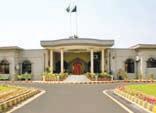 ISLAMABAD Staff RepoRt
ISLAMABAD Staff RepoRt
The Islamabad High Court (IHC) on Friday sought record from the Interior Ministry regarding cases registered across the country against specific Members of Parliament. Chief Justice Athar Minallah heard the case, filed by PTI leader Chaudhary Fawad Hussain and others. The Chief Justice inquired that what had been done in matter of MNA Ali Wazir. He noted that all the petitioners in this case were Members of Parliament and added the apex court also pointed out the same. He said that the lawmakers should attend the National Assembly sessions and represent their constituencies till their resignations were accepted and formally de-notified. Petitioners’ lawyer Faisal Chaudhry said that his client had to come from Islamabad Toll Plaza to Parliament along with cases of treason, terrorism and others. The court remarked that a political solution should be worked out for such matters to aver the country from any chaos. The court sought cases record from Interior Ministry and adjourned the case.
Rupee rebounds; gains 71 paisas against greenback
ISLAMABAD Staff RepoRt
The value of Pakistani rupee was strengthened against the US dollar as the greenback lost 71 paisa in its value in the interbank trading on Friday.
According to the data provided by money traders, the rupee showed muscles during morning session on Friday as its value appreciated against the US dollar which was traded at Rs239, down by 71 paisa in the interbank by 10:15am. Yesterday, the dollar was closed at Rs239.71. The local unit is facing slump for the last several trading sessions. During the last 52 weeks, Pakistani rupee lost 29.48% against the greenback while reaching its lowest at 239.94 on July 28, 2022, and the highest at 169 on September 23, 2021.
The State Bank of Pakistan on Thursday announced that country’s Current Account Deficit (CAD) fell to

$0.7bn in August compared to $1.2bn in July. Cumulatively, Jul-Aug FY23 CAD declined by $0.5bn to $1.9bn compared to the same period last year mainly due to increase in exports by $0.5bn & contraction in imports by $0.2bn, the bank concluded.
The market is volatile as the world is committing to help the flood-hit Pakistan. On Sept 18, Saudi Arabia rolled over a $3 billion debt for one year on the existing tough terms and the International Monetary Fund also announced support for Pakistan’s flood-relief efforts but without giving any additional loan.
IMF Resident Representative Esther Perez Ruiz on Sunday issued a brief statement, making clear the global lender’s approach towards Pakistan in the aftermath of the devastating floods.
Perez said that the IMF was deeply saddened by the devastating impact of the floods in Pakistan, offering sympathies to the millions of victims of the floods.
IMF agree to raise next tranche amount: Miftah
ISLAMABAD NewS DeSk
Finance Minister Miftah Ismail said on Friday that the International Monetary Fund (IMF) had agreed to increase the amount of the next tranche as part of the Extended Fund Facility (EEF) programme, while also hinting at the possibility of relaxation in the conditions of the agreement.
In an interview to a private news channel, the minister revealed that he had been in conversation with the IMF Managing Director (MD) Kristalina Georgieva and added that he foresaw “a lot of negotiations” before matters could be finalised still.
Speaking separately to another TV channel, he also added that Prime Minister Shehbaz Sharif had met with the MD as well and that the impact of the floods on the country’s “changed economic situation” was discussed.
“They have, indeed, understood our concerns and almost expressed agreement with that, however, the formal discussion will take place in two weeks when I will visit Washington DC,” he added. He was also confident that the government would
be successful in convincing the World Bank to release $2 billion in funds to Pakistan “by the end of the year”.
“After the floods if all of Sindh’s cotton is destroyed then obviously we will have to import it,” he said, anticipating an increase in imports. “Similarly, if we fail to sow wheat in a timely manner then that would reduce the wheat [production] as well.”
“What should we do? Shall we let our people die?” the minister questioned. “Certainly we cannot let that happen. We will have to import that [wheat] too.”
Ismail also revealed that he had met with Bill Gates – co-founder of a charitable foundation dedicated to the reduction of poverty and advancing healthcare and information technology. “We spoke with him about milk [and] other things,” he added.
The PM also spoke with the Saudi Crown Prince Mohammad bin Salman, Miftah told the media. “With him, we also spoke about food for children,” he highlighted. Responding to a journalist’s questions about the economy the minister also said that “the Pakistani government under the IMF programme and in view of the limitations it faces, is not in a position to intervene in the market”.
Saturday, 24 September, 2022 LAHORE 02 NEWS
02-03 NEWS 24 SEPTEMBER_Layout 1 9/24/2022 1:23 AM Page 1
SHAn STAnDS oUT For PAKISTAn AS englAnD wIn by 63 rUnS
KARACHI Staff RepoRt
MIDDLE-ORDERbatters Harry Brook and Ben Duckett smashed robust maiden half centuries in England’s thumping 63-run win in the third Twenty20 international against Pakistan in Karachi on Friday.
Brook scored a 35-ball 81 not out while Duckett cracked an unbeaten 42-ball 69 to lead England to an impressive 221-3 in their 20 overs after they were sent in to bat at National stadium.
Shan Masood led Pakistan’s recovery in a 40-ball 65 not out but they finished well short on 158-8 in 20 overs to give England a 2-1 lead in the seven-match series.
The match proved an anti-climax to Pakistan’s big ten-wicket win in the second game on Thursday that avenged their first game defeat by five wickets two days earlier, both in Karachi.
Fast bowler Mark Wood — playing for the first time since March this year following an elbow surgery — dismissed Babar Azam (eight) and Haider Ali (three) while Mohammad Rizwan fell for eight and Iftikhar Ahmed six left the home team reeling at 28-4. Wood finished with 3-24 while spinner Adil Rashid took 2-32. Masood and Khushdil Shah (29) added 62 for the fifth wicket but the asking rate climbed as England’s pace-cum-spin attack continued to put the pressure.

Masood’s knock had three boundaries and four sixes.
Dengue onslaught rages on as twin cities report 174 more cases
ISLAMABAD Staff RepoRt
The federal capital reported 77 new dengue cases while its neighbouring twin city Rawalpindi reported 97 in the last 24 hours. According to the data provided by District Health Officer (DHO), Islamabad, the capital, reported 77 dengue cases, including 41 from rural and 36 from urban areas, in the last 24 hours. After the new cases, the total number of dengue cases in Islamabad has gone up to 1734, while five people have lost their lives due to the dengue virus, the DHO added. Among the total cases in Islamabad, 1048 were reported in rural areas, while 686 were in urban vicinities. Dr Zaeem said that 17 patients were admitted to the PIMS hospital Islamabad in the last 24 hours, 9 in the polyclinic hospital, 3 in Federal General Hospital, 11 in the Holy Family Hospital, 5 in BBH Rawalpindi, 2 in DHQ Rawalpindi, while private laboratories reported 30 cases. The DHO said five people lost their lives to the dengue virus in the current season. While the capital’s neighbouring twin city Rawalpindi reported 97 new cases of Dengue in the last 24 hours, one person lost his life. The total number of cases in Rawalpindi has gone up to 1659, the ministry of health said.
Militant killed after CTD team comes under attack in Swat
SWAT Staff RepoRt
One militant was killed when personnel of the CounterTerrorism Department (CTD) responded to an attack by a group of militants at Manglore, Swat on Friday. The slain militant, who was identified as Adil, was a resident of the same area and was wanted by the CTD for his role in three incidents of terrorism. The remaining militants, however, managed to flee. The CTD launched a search operation in the area to arrest the absconders.
Pakistan logs 93 more corona cases, two deaths
ISLAMABAD Staff RepoRt
Pakistan has recorded 93 more coronavirus cases and two fatalities during the last 24 hours (Thursday) with infectivity ratio again dropping to 0.57 percent, showed the statistics released by the National Institute of Health (NIH) on Friday morning. According to NIH data, the death toll in the country edged up to 30,611 while the number of total infections now stood at 1,572,201 after adding the fresh 93 cases. During the last 24 hours (Thursday), 16,397 tests were conducted throughout Pakistan whereas the positivity ratio stood at 0.57 percent. The number of patients in critical care was recorded at 76.
Earlier, England posted the highest total against Pakistan by any team in all T20Is beating the 211-3 Sri Lanka made in Dubai in 2013.
Debutant Will Jacks set the platform for England with a sparkling 20-ball 40 with eight boundaries before Brook and Duckett took the attack to the Pakistan bowlers.
Brook cracked five sixes and eight boundaries while Duckett hit a six and eight boundaries as the pair added 139 runs off just 69 balls — a record fourth wicket stand for England in all T20Is.
For Pakistan, leg-spinner Usman Qadir was the pick of the bowlers with 2-48 while pacer Shahnawaz Dahani went for 62 runs in his four wicket-less overs.
Dahani’s figures are the second worst by a Pakistani bowler in a T20I, just short of
Usman Shinwari who conceded 63 in his four against South Africa at Johannesburg in 2019.
England are on their first tour of Pakistan since 2005.
Google team visits Education Ministry to discuss Pak’s 1st innovation centre
ISLAMABAD Staff RepoRt
Google for Education team along with Tech Valley Pakistan visited the Federal Ministry of Education and Professional Training to understand the current challenges of the education sector of Pakistan and discuss the execution plan for Pakistan’s first Educational Innovation Centre of Excellence in Pakistan (EICE).
EICE is a part of a larger digital education transformation journey that has been previously launched in 9 countries across the globe.
The experience, research, output, and challenges accumulated from different countries will be duplicated in Pakistan with the help of the local country partner of Google for Education, Tech Valley Pakistan.
The program will contribute to promoting skill sets for teachers and students with respect to the digital transformation of the education sector.
Aamir Ashraf Khawaja Secretary – Ministry of Federal Education and Professional Training appreciated the Educational Innovation Center of Excellence provision in Pakistan and mentioned it can transform the educational ecosystem of Pakistan
The remaining matches are in Karachi (Sunday) and Lahore (September 28, 30 and October 2).
by empowering teachers with professional development and equipping schools with technology.
Chris Malone, Education Specialist, Google for Education said, “I am excited to visit Pakistan to discuss implementation of Educational Innovation Center of Excellence at a school, Islamabad that will be transformed with the help of Google for Education tools and Chromebooks. He also added that Pakistan has a huge potential for digital transformation in the educational ecosystem.
A detailed research will be conducted in this center with the help of an academic partner where researchers will test different practices to develop a localised content and promote technology adoption at teachers and students level. Such centers were previously launched in Indonesia, Japan, Korea and Vietnam for successful digital transformation and professional development of teachers, students and administrators involved in education.
Faisal vawda’s plea against lifetime disqualification set for hearing on Sept 29
ISLAMABAD Staff RepoRt
SHC fixes case of deporting two Pakistani citizens to Afghanistan for hearing
KARACHI Staff RepoRt

Relatives of the two Pakistani nationals, who have been deported to Afghanistan have filed plea in the Sindh High Court (SHC) for their safe return on Friday.
Sardar Asif Naqashbandi and his son Wasif were mistakenly deported to Afghanistan last year in the month of December by terming them Afghan nationals, while the Kabul authorities refused to accept them as its nationals.
Due to refusal, the father and the son in custody from December, last year in Afghanistan.
The plea filed by the 24 members of Naqashbandi’s family will be taken up by the
Centre restores subsidized wheat quota for GB
ISLAMABAD Staff RepoRt

As Gilgit Baltistan is facing a short supply of wheat from the center following a disparity in wheat prices in the market and allocated subsidy, the federal government on Friday has announced that GB would be supplied the required quota of 160000 MT during this financial year.
As per an office memorandum of the Ministry of National Food Security & Research (MNFS&R), issued here

on Friday, PASSCO has been instructed to ensure supply of 160,000MT wheat to the government of Gilgit Baltistan at the ratio of 50:50 local and imported stocks.
In continuation to the food ministry, letter of even number dated 16-09-2022 on the subject and to inform that the ECC of the Cabinet in its meeting held on September 8, 2022 had approved the recommendation of MNFS&R and allowed supply of 160,000 MT of wheat for the year 2022-23 at the ratio of 50:50 local and imported stock from
Sindh High Court on October 3. Interior Ministry, Foreign Ministry, FIA, NADRA and others have been made respondents in the case.
The plea has alleged that cases of fake documents were registered against Sardar Asif and his family.
Both Sardar Asif Nasqashbandi and his son were declared Pakistani national after investigation by the SSP security and the special branch, the family said and added despite the fact, their CNICs were blocked by NADRA.
The family has pleaded with the SHC to pass order for the safe and early return of their loved ones.
The SHC has fixed the case for hearing on October 3.
maintain demand and supply situation in the area and to stabilize wheat prices,” said the notification.
The Supreme Court on Friday set Pakistan Tehreek-e-Insaf leader Faisal Vawda’s plea against lifetime disqualification over dual nationality for hearing on September 29. The threemember bench headed by the Chief Justice would hear the plea on September 29. The bench includes Chief Justice Umer Ata Bandiyal, Justice Mansoor Ali Shah and Justice Aisha Malik. The court has issued notices to all parties, including the Attorney General and the Election Commission of Pakistan (ECP). An ECP bench, led by Chief Election Commissioner Sikander Sultan Raja, disqualified Vawda for concealing his dual nationality with a direction to return the salary and other benefits he had received as a minister and National Assembly member within two months. He was also de-notified as a Senator. Earlier in April, the Supreme Court had turned down a request by PTI leader Faisal Vawda to suspend the ECP’s February 16 verdict regarding his lifetime disqualification.
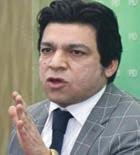
PASSCO with full cost and incidental charges fixed by the Finance Division.
As per the documents, in line with the instructions of MNFS&R, PASSCO has made an interim arrangement for uninterrupted supply of wheat to GilgitBaltistan and so far; a quantity of 78,000 MT has already been supplied from PASSCO’s stock.
“The Government of GilgitBaltistan is, therefore, requested to make necessary arrangements for immediate lifting of the remaining quantity of 82,000 MT, in order to
Meanwhile, an insider informed this scribe that while approving the release of full quota to GB, the Finance Division has not been consulted as there would be shortage of subsidized amount (Rs 8 billion allocated for this financial year) as the imported wheat would be costlier compared to the local wheat.
Last year the ECC had rejected the increase in wheat quota due to financial constraints, asking the regional government to increase the price of the commodity by 70 per cent to compensate for the additional purchase of wheat to secure the additional release.
LAHORE: Activists of Pakistan Kissan Board protest against inflated electricity bills, unjust taxes and black market in fertilizers outside press club. by
03NEWS Saturday, 24 September, 2022 LAHORE
photo
zubaiR Mehfooz 02-03 NEWS 24 SEPTEMBER_Layout 1 9/24/2022 1:23 AM Page 2
Jalila HaidEr wiNs FirsT-EvEr PakisTaN PEaCE award
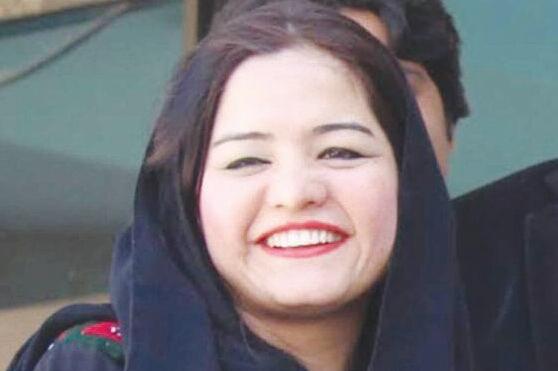 ISLAMABAD Staff RepoRt
ISLAMABAD Staff RepoRt
POLITICALand rights activist Jalila Haider on Friday won the first-ever ‘Pakistan Peace Award’ for her work and contribution to bring tolerance and sustainable peace in the country.
The Peace Award was given to Ms Jalila here at the “Pakistan Peace Festival” organized by Pak Institute for Peace Studies (PIPS) at Pakistan National Council of Arts (PNCA).
Adviser to Prime Minister on Kashmir Affairs and Gilgit-Baltistan Qamar Zaman Kaira was the chief guest at both ceremonies of ‘Pakistan Peace Prize Award’ and ‘launch of Charter of Peace’.
The lawmakers, academicians, former diplomats, retired army officers, journalists, rights activists, and representatives of civil society participated in the event besides others. The other key events at the festival included “art exhibition, live theatre, music concert, poster competition and cultural dance performance.”
The Peace Award is an initiative by PIPS to acknowledge the contribution of Pakistani
civil society in peacebuilding, peacemaking, and deradicalization through their works in varied fields. The work includes educating people through their writings or research, bringing social justice and prosperity, and advocating for gender, ethnic or racial equality.
Jalila Haider won the Peace Award after a tough scrutiny among 10 contestants by a panel of jury including Chairperson Council of Islamic Ideology Dr Qibla Ayaz, and Chairperson Human Rights Commission of Pakistan (HRCP) Hina Jilani besides others.
Ms. Jalila is a human rights attorney and founder of “We the Humans – Pakistan”, a non-profit organization, working to lift local communities by strengthening opportunities for vulnerable women and children. She specializes in defending women’s rights and provides free counseling and legal services to poverty-affected women. She is the first female attorney of the Hazara community, an ethnic minority group in Balochistan. She is a strong supporter of protecting the rights of vulnerable communities and peace-building through rule of law and justice.
She is currently actively working on ground for rescue and relief efforts of floodaffected people in Balochistan.
While receiving the award, Jalila announced to donate the award money to flood victims.
Dream of “state like a mother” yet to come true
Speaking to the audience, Adviser to PM Qamar Zama Kaira deplored that the country’s dream of “state like a mother” has yet to come true. He urged the need for collective efforts to bring peace and tolerance in the society. “There are many people in the society who support values of peace and tolerance but their voices are not reflected in the mainstream.”
PPP leader Kaira underlined that the people having intolerant behaviours have a representation in this class-based society. He said that only bringing democracy was not the solution to the problem and intuitions would have to be delivered and they needed to change their behaviours. “We have yet to cover a new and long journey to bring peace and tolerance in the society,” he said, adding that they would have to fight against their own behaviours.
The adviser said that the society was still divided into ethnicities, sects and castebased systems and the state, in the past, unfortunately used these divisions as a tool. He
concluded that they would have to adopt the way that was espoused by the civilized world to bring sustainable peace in the society. Democracy not name of only right to representation, election Chairman HRCP Ms Jilani in her remarks said that the importance of the Peace Award was that it was going to give recognition to the efforts of civil society. Democracy is not the name of only right to representation and election, it comes with a package of values, she added.
Chinese, Pak universities to build research centre on food security
BEIJING Staff RepoRt

A Chinese research university and a Pakistani university are to jointly build a research centre on food security and plant biotechnology, sai Dr Wang Depeng, professor at the College of Life Science of China’s Linyi University, in an interview with China Economic Net (CEN).
The research centre is part of the
Memorandum of Understanding (MoU) to be signed between Linyi University and Pakistan’s Abdul Wali Khan University, Dr Wang told CEN.
Under the MoU, the research centre and laboratories, which will be established at Linyi University, will focus on the disciplines of biotechnology, agronomy and food sciences.
Both sides will also recruit researchers from respective universities to work in the research centre and supervise
Pakistani cultural products displayed at Grand Canal Culture, Tourism Expo in China
BEIJING
Staff RepoRt
Three Pakistani companies have established their booths and displayed unique Pakistani products including carpets, jewelry, garments, article of woods and ceramics at the 4th Grand Canal Culture and Tourism Expo opened in Suzhou city, Jiangsu province. The Expo which is a major annual international exhibition in East China dedicated to promotion of cultural products, is being held from September 22 to September 25, 2022 at Suzhou International Expo Centre. On the invitation of the organizers, the Consul General of Pakistan in Shanghai Hussain Haider attended the inauguration of the 4th Grand Canal Culture and Tourism Expo. Senior leaders from Jiangsu province Municipal People Government and Suzhou city Municipal People’s Government were also in attendance. The Consul General of Pakistan in Shanghai visited the Pakistan pavilion and interacted with the Pakistani exhibitors. The Expo provides a useful opportunity to exhibit Pakistan’s export potential in the COVID-19 situation.
student researchers, says the agreement.
Two joint research groups will be formed, states the MoU, to conduct research of mutual interests and a joint training programme of M.Phil and PhD students will also be offered.
In recent years, a growing number of Chinese and Pakistani researchers have jointly conducted research projects to mitigate the effects of worsening climate change.
Last year, Dr Wang together with
Pakistani and Turkish scientists published four English monographs on climate-smart agriculture and climateresilient crops as the world is struggling to maintain and increase agriculture production.
Four publications co-edited by Chinese, Pakistani and Turkish researchers “Recently, I have introduced two Pakistani professors to Chinese universities,” Dr Wang said, adding that more such cooperation is also in the pipeline.
Security situation under control in Swat, Senate body told
ISLAMABAD Staff RepoRt
The Senate’s Defence Committee on Friday was assured that the writ of the state was paramount and the law and order situation was under control in Swat after law enforcement agencies launched strict action against hostile elements.
The committee, which met under the chairmanship of Senator Mushahid Hussain Sayed, received a comprehensive briefing on the security situation in Swat in the backdrop of reported activities of the Tehreeke-Taliban Pakistan (TTP), a Senate Secretariat news release said.
It was told that some violent incidents were reported in the area but the culprits behind them were traced and caught. The committee members appreciated the Counter Terrorism Department (CTD), and other law enforcement forces, including police,
Levies and paramilitary forces, who had played a heroic role to protect and promote peace as well as the lives of the people of Malakand.
They, however, had the consensus that there should not be any appeasement and no compromise on upholding the rule of law, and all those committing crimes against the people and the state must be caught, tried in the court and given due punishment as per the law.
A motion moved by Senator Dost Mohammad Khan was also discussed and disposed off by the committee.
At the outset of meeting, Senator Mushahid welcomed the new Secretary Defence Lieutenant General (R) Hamood uz Zaman and appreciated his services as head of the National Command and Operation Centre (NCOC) which was primarily responsible for containing coronavirus pandemic. He said the defence committee represented all the political parties,
NDMA issues alert amid flood warning in River Sutlej
ISLAMABAD Staff RepoRt
The National Disaster Management Authority (NDMA) Friday issued an alert to the federal and provincial departments to ensure proper preparedness and disaster management measures following the Flood Forecasting Division (FFD) forecast of heavy thunderstorm and rain in the catchment areas of River Sutlej.
The FFD in its forecast has informed that there were chances of scattered thunderstorm and rain of moderate intensity with isolated heavy to very heavy falls
expected over the upper catchment of River Sutlej. The NMDA advisory underlined that the provincial disaster management authorities (PDMAs), Irrigation Departments, respective District Administrations and DDMAs, Municipal and City Administrations were advised to ensure following measures.

It advised to maintain enhanced alert level and monitoring of developing situation to reduce reaction and response times. However, all civic agencies and rescue services (Rescue 1122 / Fire Brigade / Ambulance / Civil Defense) to remain alert and ensure availability of personnel

and equipment in at-risk areas during the forecast period. The people living along the banks of River Sutlej and in vicinity of nullahs to be sensitized on expected increase of water flows. Moreover, timely evacuation of at-risk population from lowlying and flood prone areas as per Evacuation Plans and ensure availability of shelters, food and medicines in those shelter camps. The locals, farmers and cattle herders should be forewarned to shift cattle away from low lying areas adjacent to Rivers Indus and in vicinity of rivers.
It also underscored to restrict vehicle movement in low lying and at-risk loca-
both the government and the opposition, and all the provinces, and had always worked as a bridge between the armed forces and the parliament.
“On national security issues, the committee speaks above party lines in a unified manner. The Senate’s Defence Committee will continue to play its role with unity,vigor and determination on the issues of national security,” he added.
The committee also received a briefing from the Director General of Federal Government Educational Institutions (FDEI) on the functioning of the department which had 386 schools in over 66 cities in all the provinces. The committee appreciated that the FDEI playing a positive role to promote national integration through education, and noted that its meager budget needs should be raised and it should also be treated at par with the Federal Directorate of Education.
tion, in the vicinity of rivers and nullahs.
The provision of relief and medical supplies to affected people in timely manner should be ensured by the quarters concerned whereas they should also coordinate with concerned departments for clearance of roads in case of any blockage or obstruction, waterlogging and preplacing of necessary emergency equipment at vulnerable and appropriate locations. The travelers and tourists were forewarned about risks posed by floods in vulnerable locations and may be diverted to safe lay-by and waiting areas with sufficient supply of water, food and essential medicines in case of adverse and dangerous road conditions by Police, NH&MP and Local Administrations.
Earlier, Director PIPS Muhammad Amir Rana in his earlier remarks said that violence was the biggest challenge Pakistan was facing today and the purpose of the launch of document of “Charter of Peace” was to make efforts to counter violent behaviours prevalent in the society and promote peace and tolerance. “We aim to keep this award an annual activity to be announced each year around International Peace Day (21 Sep),” he said while talking about the Peace Award.
Normalcy returns to all major rivers: FFC
ISLAMABAD Staff RepoRt
The Federal Flood Commission (FFC) has said that complete normalcy has returned to all major rivers and currently Rivers Indus, Jhelum, Chenab, Ravi and Sutlej are flowing normal. According to daily FFC report, the Tarbela Reservoir is being maintained at its Maximum Conservation Level (MCL) of 1,550 feet since August 28. At present, Mangla Reservoir is at elevation of 1192.20 feet against its MCL Conservation Level (1242.00 feet). Present combined live storage of country’s three major reservoirs (Tarbela, Chashma and Mangla) is 9.919 MAF (73.69% of total 13.461 MAF). According to the Flood Forecasting Division (FFD), Lahore low pressure area earlier over Northeastern Madhya Pradesh (India) and adjoining areas lies over Northwestern Madhya Pradesh (India). Yesterday’s trough of Westerly wave over Northern parts of Pakistan has moved away in Eastward direction and at present a fresh trough of Westerly wave lies over Northern parts of Afghanistan whereas weak seasonal low continues to prevail over western Balochistan. Weak moist currents from both Arabian Sea and Bay of Bengal are penetrating into upper parts of Pakistan up to 4000 feet.
Saturday, 24 September, 2022 | LAHORE 04 NEWS
04 NEWS 24September 2022_Layout 1 9/24/2022 12:56 AM Page 1
corporate corner
SECtIoN Not INtERfERE IN lEGISlAtIvE AffAIRS
ISLAMABAD Staff RepoRt
tHEIslamabad High Court on Friday declared that it is the parliament’s prerogative to carry out legislation, saying that the court will not interfere in it.
PM tells UNGA Pakistan paying double cost for global inaction
 contInueD froM pAge 01
contInueD froM pAge 01
KASHMIR DISPUTE: The prime minister told the world body that Pakistan looked for peace with all of its neighbours, including India. However, the sustainable peace and stability in South Asia remained contingent upon a just and lasting solution of the Jammu and Kashmir dispute.
“At the heart of this longstanding dispute lies the denial of the inalienable right of the Kashmiri people to selfdetermination. India’s illegal and unilateral actions of 5th August 2019, to change the internationally recognized “disputed” status of Jammu and Kashmir and to alter the demographic structure of the occupied territory further undermined the prospects of peace and inflamed regional tensions,” he remarked. He said India’s relentless campaign of repression against Kashmiris had continued to grow in scale and intensity. In pursuit of this heinous goal, New Delhi has ramped up its military deployments in occupied Jammu and Kashmir to 900,000 troops, thus making it the most militarized zone in the world.
“The serial brutalization of Kashmiris takes many forms: extrajudicial killings, incarceration, custodial torture and death, indiscriminate use of force, deliberate targeting of Kashmiri youth with pellet guns, and ‘collective punishments’ imposed on entire communities,” the prime minister told the General Assembly.
Prime Minister Shehbaz said India was seeking to turn the Muslim-majority Jammu and Kashmir into a Hindu-majority territory, through illegal demographic changes.
“Millions of fake “domicile certificates” have been issued to non-Kashmiris; Kashmiri land and properties are being seized; electoral districts have been gerrymandered; and over 2.5 million non-Kashmiri illegal voters fraudulently registered. All this is in blatant violation of Security Council resolutions and international law, particularly the 4th Geneva Convention,” he told the 193-member world body. He said Pakistani people have always stood by their Kashmiri brothers and sisters in complete solidarity, and would continue to do so until their right to self-determination is fully realized in accordance with the relevant UN Security Council resolutions. The prime minister assured the world that Pakistan remained consistent in its commitment to peace in South Asia. “India must take credible steps to create enabling environment for constructive engagement. It should demonstrate its sincerity and willingness, to walk the path of peace and dialogue by reversing its illegal steps of 15 August 2019, and ending forth-with, the process of demographic change,” he remarked and expressed the hope that the UNGA and Secretary-General would play their rightful role in urging India to implement the long pending UN resolutions.
IHC Chief Justice Athar Minallah expressed the remarks during the hearing of a petition, seeking repealing of Section 124-A of Pakistan Penal Code on Friday.
The petition was filed by former human rights minister and PTI leader Shireen Mazari. She attended the court proceedings along with her lawyer
Abuzar Salman Khan Niazi.
While presenting his arguments, lawyer Niazi said that Section 124-A was being used to suppress the freedom of expression. He further contended that the aforementioned section which is related to file the sedition cases was in repugnant to the basic rights as guar-
HEC grants 2 semester fee deferral to students from flood-hit areas
ISLAMABAD Staff RepoRt
Higher Education Commission (HEC) Chairman Dr Mukhtar Ahmed on Friday said the students from flood-affected areas, enrolled at public and private universities, would get fee deferral for two semesters to mitigate their problems.
Talking to APP, he said all public and private universities were working to facilitate people of the flood-hit areas, adding that veterinary universities had also been directed to support livestock
in these devastated areas. “We are also working out a proper plan for compensating the universities in the flood-hit areas.”
The HEC chairman said: “Since technology and education are interlinked, we have to opt for policy to promote technology in the education sector of the country. During the Covid-19 pandemic, the idea of smart classrooms and technology did help in continuing the educational process sans any pause.
“In the coming years, due to revolution in the IT sector, we will not have a formal need of

buildings, and rather phones will be sufficient for acquiring and disseminating education. The future education will be online and there would be lab practices through virtual simulations.
“We will adopt optimum world practices to ensure quality education through online and latest technology, and around 10 to 15 percent budget allocation is mandatory for each university for distance education system, which will be increased to 50% after some time with a proper plan and consultation of all private and public universities.”
Sindh utilizing all-out resources for water drainage from agri land: Memon
KArAchI Staff RepoRt
Out of 4.7614 million cropped area, as many as 3.773 million acres destroyed in recent rains and flash floods across the province. The Sindh Information Minister Sharjeel Inam Memon revealed this in a press statement on Friday. He added that it is top priority of Sindh government to provide relief to the farmers . The government is utilizing all available resources to drain out stagnant water from agricultural land so that the farmers could sow next season crops. In order to provide relief to the farmers, the Sindh government has fixed the support price of wheat at Rs. 4000 per 40kg for the next year crop. Apart from this, steps are being taken to deffer the recovery of agricultural loans and steps are being taken to provide seeds to the farmers. ' According to the report of the Works and Services department as many as
2548 government buildings have been destroyed by the recent rains and floods including schools, basic health units, and others, ' the minister said. He said that the Sindh government has formed committees to assess the actual data of the damages, which will start their survey from comming Monday. Mr. Memon said that the water level at two barrages of Indus River has fallen below 1 lakh cusecs. Guddu Barrage has recorded an inflow of 87300 cusecs and an outflow of 76000 cusecs , while inflow at Sukkur barrage, is reached 92200 cusecs and outflow at 82000 cusecs. He said that inflow at Kotri Barrage is 203100 cusecs and outflow at 199300 cusecs.He said that affected people has started to return their abode from the areas where the water has been drained out. He said that families residing in relief camps established in schools in various areas of province including Union Coun-
cil Tando Hyder, Union Council Moosa Khatian and other areas had returned to their villages.The district administration is providing transport facilities, tents and ration to the returning affectees . The minister said that 4 more precious lives have been lost and rain related deaths risen to 728, while 8422 people injured. Another 26,506 cattle were reported to be perished, taking total number to 340,015.
Sharjeel Inam Memon said that according to the report received, 1061788 houses were partially destroyed and 720799 were completely damaged. He said that relief activities are under way and 295093 tents, 281669 plastic tarpaulins, 2309809 mosquito nets, 749762 liters of mineral water, 40575 jerry cans, 7579 pillows, 4620 bed sheets and other relief items have been provided to the flood hit people, while 777120 families have been given ration bags .
anteed in the Constitution of Pakistan.
At this juncture, Chief Justice Minallah reminded the lawyer that sedition cases had also been registered during the PTI government.
“It is parliament’s prerogative to do the legislation and court will not interfere in it,” he judge remarked.
ICCIA hosts 4th session of Best of Entrepreneurship
KARACHI: The Islamic Chamber of Commerce, Industry & Agriculture (ICCIA) will conduct the “Best of Entrepreneurship Pakistan (BOE)” session in Karachi. The theme of the event is E-Commerce and Entrepreneurship in Pakistan and will highlight challenges faced by the industry as well as the opportunities it brings for young entrepreneurs.
The BOE event aims to share entrepreneurial trends and stories that will shape the future of ecommerce in the country. The audience will include Technical, and Vocational Education and Training (TVETs) focused on e-commerce, university students, aspiring entrepreneurs, and enthusiasts. “ICCIA’s mandate is to develop and grow the private sector of the Muslim world. To increase the participation of our businesses in the global supply chains. To support the “resilience” and “sustainable” in the term resilient and sustainable economies. And this happens when there is a strong private sector that creates jobs and supports multiple socio-economic goals as well as increases the country’s productive capacity,” Ms. Aalia Jafar, Director of International Relations, Islamic Chamber of Commerce, Industry & Agriculture (ICCIA), said about BOE.
Prominent personalities, including Mr. Haider Zamin, Deputy Director TDAP, and Vice President of FPCCI will be present at BOE. Notable names from the tech and e-commerce industry, such as Mr. Hamza Abdul Rauf. pR
2,530 cameras to be added to safe city network in phase-II
ISLAMABAD Staff RepoRt
A total of 2,530 new cameras will be added in the Safe City project during the second phase to ensure broader online monitoring to prevent crimes in the city. According to police source, cameras operated by the Capital Development Authority (CDA), privately owned Malls, F-10 Markaz and food chains have also been integrated with the main server of the Safe City Islamabad. The source said that a total of 99 percent cameras were functional at present for online monitoring. Four months back, only seventy percent cameras were working due to massive fiber cuts and lack of interest on part of the vendors. All the artificial intelligence software like ANPR (Automatic Number Plate Reader) and FR (Facial Recognition) were inactive since the installation of Safe city. However, FR and ANPR cameras were now operational and PUCAR 15, Eagle Squad and supervisory structure of safe city had been brought under one roof for an organized and concerted effort to prevent crimes.
Fallacy of Notions: Transgender Persons Act, 2018
IffAt fArooq
A malicious and baseless campaign has been launched against the Transgender act recently passed by the parliament in Pakistan.
There is a dire need for national dialogue to dispel unfounded assumptions, and resilient determination is required to address these fallacies. There are many fables and myths attached to the bill. In the wake of recent debate and some religious contours attached to the bill, the Federal Shariat Court allows petitions claiming that the 2018 transgender law as repugnant to Islamic injunctions. Although, the law aims to explore legal solutions for perfecting the grievances of the marginalized community but it has sparked a fierce response from the activists who rejected the misinterpretations vehemently.
Pakistan has checkered a history of legislation for marginalized segments. These legislations include the most controversial and debated Hudood Ordinance and legislation for Ahmadiyya community is also illustrative of constitutionalism taking a backseat and obscurantism in the forefront. Gains of constitutional and legal reforms are fragile. Federal Shariat Court will surely countersign how a simple bill of human rights safety for
Trans people has been hyped to the extent of religious decree. This law has been thoroughly researched and consulted with Islamic ideological council, political parties, and civil society and most importantly with the transgender community before it was tabled in Parliament. The issue has been conflated to the extent for fear mongers that many transgender people have been injured in Peshawar as the consequence of ill-conceived campaign on the bill. News of trans women being murdered in their homes and on streets made headlines. “We keep fighting a battle from our births till our death. lamented by the community head in the vigil protest at Islamabad.” What can be bigger tragedy than the family is not accepting the body of slain relative due to social taboos?
The new law is focused on the entitlements to the rights guaranteed by the constitution.
The act of 2018 grants Trans people their essential rights to education, dignity and employment. The law focuses the right of transgender people to get their ID card on their self-perceived gender identity and it also reaffirms their right to live with dignity, free from harassment and discrimination and as equal citizens. The transgender people cannot be deprived of the right to vote or run
for office. It lays out their rights to inheritance, in accordance with their chosen gender. State guarantees the protection of the community so that they can earn a living by honorable means instead of banking upon only a few jobs like dancing, begging and prostitutions. This hardcore marginalization for the Trans community is entrenched in the social fabric of the subcontinent. Marginalization connotes vulnerability of a section of society and is a process that drives a particular segment to periphery, fringes and margins, which leads to exclusion and contributes to oppression. Pakistan’s transgenders, mocked by most and abhorred by many. Strict binaries of male and female genders palpably exist in society. They also face social stigmatization, exclusion and banishments. The discriminatory behavior in society leads towards a distancing environment for ostracized communities. All history’s been a history of class struggles between dominated classes at various stages of social development but in this part of the world the marginalized segments have to go through marathon struggles and grueling paths. National Center of Transgender Equality reported that 90% of transgender people have experienced discrimination and
harassment at work place & school. Feinberg circulated a pamphlet in 1992 for transgender liberation “A movement whose time has come”. He identified traces of oppression imposed by the ruling class using institutions. The elite class and institution has enforced a gender binary at the expense of communal societies. A Pakistani transgender rights activist, Dr. Mehrub Moiz Awan says, “As visibility increases, so does violence. And the hegemonic always use moral policing to gatekeep alternative voices and opinion. It’s happened before; it’ll happen again. That’s the cycle of struggle for redistribution of power.’ Patriarchal economic privileges are achieved by devalued and debased roles of women and other marginalized segments.
Travesti activism took off in Argentina, which established the longest trajectory and impact for the rights of the marginalized and how they are oppressed by the apparatus of elite gender expression. Elite institutions enforced a gender binary at the expense of communal expenses. The social stigma of being transgender is a cause of poor health care, violence, discrimination and extreme poverty. Cultural sexism is another marked singularity of discrimination as feminine appearances are mocked and stigmatized. Ac-
cording to a recent report by the United Nations Development Programme, only a few countries in the Asia-Pacific region legally recognize non-binary genders, making it difficult for transgender people in the region to obtain official identification documents that reflect their identity. It is considered one of the most progressive Trans rights bill and is a major milestone for a conservative South Asian country. Now the political parties are using it for political gains which are an act of cruelty directed towards the Trans community. Engagement in misinformation without doing due research will cause more marginalization to the community who already survive under high risks of existential threats. Juno Dawsen a Transgender rights activist, in her book, presented a holistic concept for her community. “I dare to dream of a world where people can dress, speak and behave how they want, free from mockery, derision, judgment, harassment and danger. This is what I want. Who’s with me?” It is a high time to stand with dreams of thousands of marginalized Transgender persons in Pakistan though the legislative reforms and help them to realize their dreams. (The writer is a public policy practitioner and she has a keen interest in global sociopolitical arena).
LAHoRe: ETPB Chairman Habibur Rehman Gillani witnesses artwork during Religious Tourism exhibition.
Rana Muhammad Arif, Muhammad Zeeshan Gursi and Amir Hashmi also present. Staff photo
05NEWS Saturday, 24 September, 2022 | LAHORE
124-A REPEAl: IHC SAyS wIll
The case for debt swaps
THE human suffering and the destruction of Pakistan’s infrastructure is not of the country’s making. Driven by global climate change Pakistan became a victim despite the fact that it contributes less than one percent to the global carbon footprint. The sheer scale of the calamity has stretched the country’s resources and capacities to the limit, thus necessitating support from the international community, particularly the industrialized nations, some of whom have made reckless use of fossil fuels that are responsible for climate change.
As Prime Minister Shehbaz Sharif put it, countries like Pakistan who have done almost nothing to contribute to global warming, do not deserve to be amongst the frontline countries impacted the most by climate change.
At the end of his ‘solidarity visit’ to Pakistan, Un Secretary General António Guterres pledged to strongly advocate ‘debt swaps’ with the IMF and World Bank, as well as at the G-20 meeting, to enable poor and middleincome countries, including Pakistan, to use that money to invest in climate resilient, sustainable infrastructure and green transition of their economies. The initiative taken by Secretary General Guterres would be welcomed by the low income countries with limited resources to deal with the unavoidable impact of climate change. Climate crisis in these countries would otherwise turn into a significant poverty multiplier.
A Un policy memorandum has suggested to Pakistan to suspend international debt repayments and seek restructuring of loans. Pakistan, whose external debts total about $100 billion, has been struggling with a balance-ofpayments crisis that had strained its ability to repay loans even before the rains and floods devastated a large part of the country, three time the size of Secretay General Guterres’ native Portugal. Pakistan is virtually in a debt trap as it has to borrow more money every passing year to pay back its debt and support its budget. The UnDP argues that Islamabad and its creditors should find a longer-term solution that would involve lowering Pakistan’s debts to a sustainable level to enable the government to put people’s needs first. The real task is to persuade the rich countries to agree to the debt swap scheme. Pakistan has to ensure meanwhile that the scheme is not used to create differences with China.
A new headache
PERHAPS, the most useful medicine in flood-hit areas is paracetamol. Though it is primarily used as a cold or flu medicine, it is also useful in cases of dengue and other viral infections, because it is an antipyretic, which controls symptoms and thus allows the patient to recover without the danger that high-grade fever can bring.
Unfortunately, the floods coincided with the most popular formulation, Panadol, going off the market, after a pricing dispute with the government ending with the manufacturers deciding to stop making it, as it did not make economic sense to keep making it at the price the government allowed.
True, paracetamol has not disappeared off the shelves, being available in other formulations manufactured by other pharmaceutical firms, but the facilities available for the manufacture of these pills cannot be ramped up to meet the suddenly increased demand, which will be pushed up further by the coming winter.
This is not the first time the government has failed to ensure the supply of an essential. Every Ramazan and Eid, prices of foodstuffs go up. The example of petrol prices is to hand, with an increase coming at a time when international prices are falling, so that the government can get the difference.
The government should have ensured the availability of Panadol, either by subsidizing its manufacture, or by obtaining supplies at least for itself, at an economic price for the manufacturer. There is too disturbing a trend of official neglect of citizen’s needs to be ignored.
The assumption by the constituents of the government machinery, both elected and permanent, that the citizenry exists to provide them with their perks, must come to an end, and be placed by the view that they exist to provide that citizenry a better life.
Resumption of Haqiqi Azadi
idea of having a clandestine team of economic experts who would change the country’s destiny, if his party assumed power. After coming to power, no such financial wizard surfaced. All rhetoric turned out to be hollow, just political gimmickry.
Seeking monetary advantage from the expatriates is possible on the paper but not on the ground. The expats are mostly working-class settled in various parts of the world. They survive by scraping money together and by squeezing their resources. They send funds to their families regularly to make their survival possible in Pakistan. Some expats become rich over time but this does not mean that their number has crossed the figure of 500,000. Interestingly, during its three years stint in power, the PTI did not invite such a display of generosity from the expats.
ment sector to the private one for job and survival.
This turn around brought about a new challenge. The government employees saw the burgeoning of the private sector which paid high salaries. A salary competition set in. The post-2001 era saw an exponential increase in the salaries of the government employees, both those who worked in the civil domain and those who worked in the army. The trend of doubling the salaries was also witnessed in both civil and army realms.
On September 21, while addressing the lawyers’ convention in Lahore, Chairman Pakistan TehrekeInsaf (PTI) Imran Khan said that people from all walks of life must join the resumption of the haqiqiazadi (real freedom) movement which would be resumed from September 24.
Resumption means from the point where the movement ended on May 25. The hiatus gave the PTI sufficient room for recovery. To replicate, the PTI wants to construct the next sequel of the azadi (freedom) movement of 2014 which began on August 14 and ended in December 17 the same year in Islamabad. The PTI once again thinks that reactive rowdy politics under the rubric of nationalism of some sort can pay dividends. The question is this: will 2022 replicate 2014? Another could be this: are the ground realities constant from 2014 to now in 2022?
On the occasion of the convention, the economy got the most focus in the speech. Khan came up with a novel presumptive solution: if 500,000 overseas Pakistanis (out of millions settled abroad) invest in Pakistan, the country would not be in need of international loans to run its affairs. Interestingly, in the run-up to the general elections of 2018, Khan sold the
Banking on the expats for the provision of funds in the shape of investment is merely wishful thinking. It is more deceptive than practical. It can only be thought of as a contribution to the economy when there are dozens of other contributing factors available, and not a sole reliable flaunted factor as an economic policy vision. The expatriates mostly invest in the activities of buying and selling lands. The process makes money shift hands but it does not open new economic opportunities. Can the expatriates invest in science and technology is the major question. The answer is a probable no.
The same is the problem when pre-electoral pledges turn impractical like constructing houses in millions and providing a substantial number of employment opportunities. Such promises are meant for electoral consumption only. Pliable people forget to understand this point.
Pakistan’s economy has become complex. Before 1999, the mainstay of the economy was direct taxes but under Finance Minister Shaukat Aziz (19992007), the emphasis of the economy was turned towards indirect taxes. The basic reason was that direct taxes were prone to leakage through the income tax assessing officer. However, indirect taxes have come up with the facility of introducing new indirect taxes or increasing the rates of the existing indirect taxes. Before 1999, the economy was slow and expenditures were low, but afterwards the economy turned to high spending, both at the individual and the national level. There is no going back now. Indirect taxes were coupled with privatization and economic liberalization, crossing over the era of stagflation (inflation and unemployment) in 2001. The economic policies pushed the dependence of a common man from the govern-
The rise of the private sector introduced a market economy depending on imported products meant for sale. The consequent services sector, besides generating employment, enhances the import bill. The services sector has outgrown the agriculture and industrial sectors within the context of the GDP. There is no going back now. The overall consequence is that Pakistan is witnessing simultaneously high inflation and high expenditures choking the economy every second or third year. The point is simple: enmeshed in the habit of high expenditure and doubling the salaries, Pakistan cannot come out of the debt trap. The packages of the International Monetary Fund are simply punishing Pakistan for s uch practices.
Pakistan needs to minimize its expenditures and devise economic policies that could revive the agricultural and industrial sectors. Pakistan needs investment in building the sector of information technology, as India did in Banglore, Hyderabad, Mumbai, Chennai and Delhi – India’s five top tech cities.Pakistan needs to develop softwares which could be sold to the world to earn foreign exchange.
From 2018 onward, both the PTI government and the army promoted social media warriors officially to snub opponents. neither of them promoted the idea of nudging the youth towards developing softwares, earning copyrights and selling their products to the world. Both spoiled the youth, which is now mired in trolling and cropping.
Instead of tech-savvy neighbours such as India and China, Pakistan sees itself more like Afghanistan, a war torn militia-run country surviving in isolation. Dependent on the major export of opium, Afghanistan should not be an example for Pakistan on how to survive.
In short, the cost of haqiqi azadi is an arduous economic struggle. Dropping the idea of ploys, the PTI must come up with sound economic plans to run the country, if and when it resumes power at the Centre.

The writer is a freelance journalist and can be reached at qaisarrashid@yahoo.com
Shared parenting in child custody litigation

is claimed. However, these laws warrant a review.
social interaction and engage in developmentally beneficial activities such as teen sports. It has also been noticed that teens from broken families develop a cynical attitude towards relationships and harbour feelings of mistrust, both towards parents and any potential partner.
Shared Parenting is the title of the book written by a distinguished and acclaimed lawyer, Fahad Ahmad Siddiqi, who advocates that the separation or divorce occurs between spouses and not between parents.
The book is an excellent guide for the practicing lawyers and Family/ Guardian Judges as the author did great research on various topics covering different aspects of child custody litigation not only from the legal point of view but also from the social side. This book is testimony to the fact that family formation patterns have altered significantly in Pakistan with the rise in dissolution of marriages cases. A broken family has negatively affected all domains of divorce and affected children’s development and social relationships in several ways.
A close perusal of the book shows that the author has painted the sufferings of non-custodial parents in a lucid manner as he opined that a large number of the non- custodial parents involved in child custody litigation, after separation between the spouses, bear the brunt of the arbitrary and capricious practices that are being followed by the Family/ Guardian courts in Pakistan. Under the present legal system of Pakistan, a gender-biased approach in the matters of child custody has deprived a large number of divorce-affected children from the love, care, affection and company of the non-custodial parents.
Some children act out their distress about their broken family by acting aggressively and by engaging in bullying behaviour, both of which can negatively affect peer relationships. Other children may experience anxiety, which makes it difficult for them to seek positive
The custody of the child generally rests with the mother at a tender age as our courts believe on this principle that ‘the lap of a mother is God’s own cradle’. However, this principle by no means deprives the father from having access to and temporary custody of his children and spending some quality time with them at his own home. Unfortunately, the courts’ attitude towards the non- custodial parents has exacerbated their sufferings by not allowing them home visitation to meet their beloved children at their homes. In child custody litigation, it has been witnessed that non-custodial parents get once a month a few hours’ visitation right to interact with their children only within court premises. I concur with Mr Siddiqi on this point that our legal framework is silent on how visitation issues should be handled and what should be the process of dispute resolution between parents over children.
Apparently the training of Family/Guardian Judges at the Punjab Judicial Academy is flawed and outdated, bringing in acute hardships to not only the already divorce-affected children but also to the fathers for being non- custodial parents who suffer from contact denials with their divorce -affected children. Separated or divorced parents agitate against unnecessary delays in legal proceedings, resulting in denial of speedy access to their children.
Separation and divorce represent the death of a marriage but for a child caught in the middle or too young to understand the significance of visitation rights it could mean the death of a parent. Quite often child custody litigations prove damaging for both children and the parents. The Guardian and Wards Act, 1890 read with Family Court Act, 1964, are the fundamental laws under which the custody of minors
Elsewhere in the world, estranged parents are encouraged to resolve child custody issues through mutual agreement. This is usually done through out-of-court (though with legal help) dispute resolution processes like mediation and collaborative law. The latter is a relatively new legal approach to family conflict resolution involving lawyers and is increasingly gaining acceptance in many countries.
Mostly single- fathers brand themselves victims at the hands of manipulators of guardian or family laws of the country, soit has become necessary for the legislators to incorporate provisions in the law whereby an interim joint custody should be announced by the court immediately when either of the parents files a suit for custody of his or her child
It has also been witnessed that it takes years to fight exhaustive child litigation. Therefore an amendment to the existing laws be made to make it obligatory upon the guardian courts to resolve the issue of child custody within a period of four months, and no unnecessary adjournment be granted to the parties to prolong the litigation. In normal circumstances, the courts must discourage visitation within the court premises as a Division Bench of the Baluchistan High Court held in abdul Khaliq vs. Ms. Mahnoor and others that “court was to facilitate a congenial, homely, and friendly environment and reasonable visitation schedule. Office of the Guardian Court, for the said purpose, was neither conducive nor effective which lacked proper facilities and arrangements, and was not comparable to a homely environment”. The meeting within the court premises could not serve the purpose of meeting. The federal and provincial legislatures should make necessary amendments to the existing laws to help ease the sufferings of both divorce-affected children and non-custodial parents.
The writer holds an LLM in Constitutional Law from Punjab University. he can be reached at mianrauf2172@gmail.com
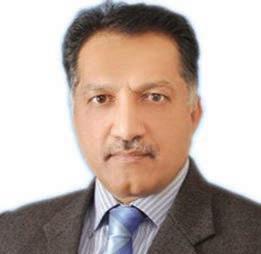

The drug most needed in the post-flood era is driven out of the market to resolve issue amicably Nizami
Dedicated to the legacy of late Hameed Nizami Arif Nizami (Late) Editor
Mian rauf
In normal circumstances, the courts must discourage visitation within the court premises as a Division Bench of the Baluchistan High Court held in Abdul Khaliq vs. Ms. Mahnoor and others that “court was to facilitate a congenial, homely, and friendly environment and reasonable visitation schedule.
Dr Qaisar rashiD
06 Saturday, 24 September, 2022 COMMENT Lahore – Ph: 042-36300938, 042-36375965 I Karachi – Ph: 021-35381208-9 I Islamabad – Ph: 051-2204545 I Web: www.pakistantoday.com.pk I Email: editorial@pakistantoday.com.pk
Need
Yousaf
Editor
Founding
M. A. Niazi Joint Editor Umar Aziz Executive Editor Aziz-ud-Din Ahmad Joint Editor
There is no economic plan When a marriage breaks down, children suffer 06-07 Comments - 24th September 2022_Layout 1 9/24/2022 12:07 AM Page 1
COMMENT
Editor’s mail

Send your letters to: Letters to editor, Pakistan Today, 4-Shaarey Fatima Jinnah, Lahore, Pakistan.
E-mail: letters@pakistantoday.com.pk Letters should be addressed to Pakistan Today exclusively

Time to payback
SPACE technology firm Maxar Technologies, based in the United States, shows one-third of Pakistan under water. Monsoon rains have wreaked havoc on Pakistan; many have lost their lives and many more have been displaced. Pakistanis everywhere, particularly in Karachi, have helped in whatever way they can, but it is not enough. The people of Pakistan need now more than ever to rebuild their country after these ‘monsoons on steroids’, as the United nations Secretary-General Antonio Guterres aptly put it. This is the time to show compassion. Pakistan has been led to endless wars in the quest for ‘peace’; be it the US-led war in Afghanistan, where Pakistan took in Afghans escaping the conflict to add to the strain on the already weak economy, or the peace-led missions in Africa. now Pakistan itself needs to find that peace and move forward after the devastating floods so that it may better prepare for the future. The world commu-nity owes Pakistan a lot. It is payback time.
Missing patches
Floods and The Climate
up to five times as compared to a scenario without climate change.
In the famous 2015 Paris Climate Agreement, that was signed by almost 200 countries, these countries had pledged that the temperature in the pre-industrial era, that is the time between 1850-1900, compared to then the countries would ensure that the global average temperature would not rise by more than 2°C. It would preferably be maintained at an increase of 1.5°C. The more the average temperature of the Earth increases, the more we’ll get to see these extreme weather events. With every increase of 1°C, very disastrous effects follow. According to Scientists, 95 of the increase in CO2 is because of human activities. In the last 70 years, the population all over the world has increased three times.
rate into as the air is already saturated with all the water vapour it can carry. So the evaporation will not take place and our body will not be able to cool itself.
Technically speaking, the term Wet Bulb Temperature is used here. It is the lowest temperature that can be achieved by evaporative cooling, A Wet Bulb Temperature of over 35°C is deadly. This is the reason why the 45°C of Dubai and Sibi, Pakistan, where there is dry heat with little humidity in the air, seems more bearable as than 40*C on the beaches of Kerala.
Dr Zeeshan Khan
EvERy year Pakistan faces floods but the preparation to escape them is never the priority. Even in 2010 Pakistan faced a super-flood but even then things were not taken seriously. 20 million people were affected in 2010. Emergency was declared. However, floods in 2022 are worse. More than 40 million people have been affected, which means seven times more people than those internally displaced by the Ukraine war, or roughly 94 percent of the population of Canada. Hundreds have died or been injured, with numbers still rising. Floods inflicted more than $10 billion in losses across Pakistan.
These torrential rains are the main cause of flooding triggered by climate change, for which developed countries are the culprits. Food insecurity and inflation has literally paralysed not only the middle class but flood victims. Over a third of the country has drowned in the flood waters. Economic situation is grim already. Pakistan is considered the ground zero of global warming and the fifth country most vulnerable to climate change, says German Watch Report.
There is a lack of dams, water reservoirs, planned urban settlements and reforestation. Human catastrophe is at its peak. Over half a million pregnant women are in dire need of care in flood-hit areas. Seventeen percent of the population are suffering badly. Even so nearby cities will have to sustain the exodus from flood-hit areas. More than 0.75 million livestock have been lost. From the 1990s average temperature has kept on increasing.
Climate change is a reality and it is occurring now. Extreme weather conditions get a boost from climate change. Floods are also because of climate change. These events even become frequent, they occur more and become more intense.
Often people have a misunderstanding about global warming, that because of global warming there will be more heat. But we cannot always conclude this. Due to climate change, there is an increase in extreme weather events. It means summers will become hotter but winters may become colder and unexpected weather events and natural disasters will become more frequent and more severe.
Michael E Mann, a professor of Atmospheric Science, says the frequency of heat waves has tripled now from the 1960s and the frequency of record-breaking hot months has gone
When I used to read about global warming as a child, I used to think, ‘What’s the big deal?’ Even if the temperature of the Earth increases by a degree or two, who’d care? It’ll only be two degrees more, it’ll still be bearable.’ But the reality is much more dangerous than this. Because with the rise of 2-3°C, the extreme weather events rise exponentially. Summers become very hot. The chances of a heatwave developing increase a lot. The tornadoes, floods and droughts, become exponentially more likely. And the biodiversity is harmed.
In fact, there are severe effects on the Earth with a steady rise in temperature. Compared to pre-Industrial levels, the temperature has already risen by 1.2°C. nonetheless, if it rises to 2-3°C then conditions will be more severe and many places and countries will be unliveable. Moreover, this temperature rises to 4-8°C then the real apocalypse will start, many regions will be unliveable and further severe weather events will occur and many cities and countries will go under the water.
We can see flash flooding in Karachi, smog in Lahore, drought in Thar, short winters in KPK and now wrecking floods all across Pakistan. Limiting global warming to 1.5°C can’t just be an ambition, it’s an imperative.
This temperature rise is not equal in all parts of the Earth. Some places it is more, at others, it may be less. And Canada is a place where it is more than average. In 2019, the average temperature in Canada had increased by 1.7°C. The Middle East is getting hot at twice the world average. Between 1948 and 2016, there the temperature had already increased by 2.3°C.
A 2015 study found that in mountainous areas, above the height of 2000 metres, the effects of global warming would be felt more than at lower elevations. Climate change and global warming will be 75 percent faster there than lowlands. Before talking about solutions, let’s clear another misconception. For some people, this temperature of 49°C will not seem a big deal, especially for the healthy and fit. They can bear even 50°C if very healthy and fit, and even up to 52°C. However, temperature above 35°C can be deadly for all types of people in certain conditions.
This is the truth. Because humidity is a very important factor when talking about the temperature, and 35°C at 100% humidity can be deadly irrespective of how healthy and fit you are. When it is hot, all of us sweat. Sweating is our bodies’ way to keep us cool. The sweat evaporates due to the heat and so our skin remains cool. But if there is 100 percent humidity in the air, then the sweat will have nowhere to evapo-
Scientists predict that in the coming years, due to climate change in some areas of the world, there will be Wet Bulb Temperature of over 35°C, literally deadly for human lives. Pakistan is an agricultural land and 50 percent of its population is agricultural based and it will have to decide that How Pakistan’s economic landscape will shape up post floods.
Some researchers from MIT developed an interesting simulator to show the rise in global average temperature by 2100, and how that temperature will react to various policy changes across the world in all countries. The conclusion from this is that the biggest impact is from Carbon Taxes.
When it comes to the solutions to fight against climate change, books often suggest turning off the lights in unoccupied rooms to stop wasting electricity or using bicycles instead of motor vehicles. Doing all these is definitely good.
But the problem is that all this information is quite outdated today. Had everyone been asked to practise these 20 years ago and had everyone done so, it might have made a difference. But for now, on an individual level, even if everyone starts following these little practices, it will have a negligible effect on climate change.
Today, the situation has deteriorated so much that only policy changes at the government level can bring about real change. Firstly, the subsidy on fossil fuels needs to be removed. Secondly, all the governments in the world need to push for electric cars. Irresistible incentives have to be given for the purchase of electric cars. Thirdly, they need to levy a Carbon Tax. So that the companies get motivated to use less fossil fuels. Fourthly, Encourage the use of renewable energy and grow plants and trees. Fifthly, and on an individual level, we need to raise awareness regarding climate change and try to reduce pollution, the carbon footprint and single-use plastic bags.
The industries creating most of the Greenhouse Gases are Construction, Transportation, Food industry, Energy.There is a need to incentivise sustainable production and penalise excessive pollution. Government public policy must be affected
Providing adequate healthcare during these gigantic and unprecedented floods is a big challenge. There is a ‘Public health Crisis’ as flooding destroyed many hospitals, hHealth centres, health systems. While first aid, food, clean drinking water and shelter are the priority for all the affected.
dr. Zeeshan Khan is a professional pharmacist, WhO Certified professional with Certification ‘’CCrP” in clinical research from Canada, environmental activist and a commentator based in Lahore, Pakistan. he can be reached at dr.zeeshan.alias.ghazikhan@gmail.com and tweets at @drZeeshanKhana1
 ANGABEEN AHMAD KARACHI
ANGABEEN AHMAD KARACHI
THE Quetta-Karachi highway has been washed away at various places by the recent floods. People travelling between the two cities are doing so at great risk, and several accidents have already taken place due to the missing patches. no politician, media anchor, or government official has taken notice of the dangerous condition. One wonders if the road will ever get repaired at all. The relevant authorities need to take note of the situation and take necessary steps.
AMEER SAJIDI KHUZDAR
Significance of Pharmacists
PHARMACISTS have immense significance in a country’s overall healthcare delivery mechanism. In most parts of the world, the profession of pharmacy is held in high esteem, as should be the case, but in Pakistan the worth of pharmacists is not more than a wage-earner, who is supposed to work long hours just to make ends meet. Such treatment of pharmacists must be done away with.
SIDDIQUE ANSARI JACOBABAD
Dirty politics
THE damning revelation about a botched attempt by the opposition through its two provincial governments to subvert a deal with the International Monetary Fund (IMF) was really lamentable. Ostensibly, the motive behind such a move was to undermine the efforts of the federal government, regardless of a negative and ruinous upshot of such an endeavour which could have had very grave consequences for the national economy. Luckily, such an ill-conceived opposition bid to scuttle the deal did not bear fruit and the country, which was in a sense on the brink of default, was saved after meeting some seriously tough demands of the lender agency. now, when the country is facing a double whammy in the face of a fragile economy and a monumental challenge in the shape of an unprecedented deluge in Sindh and Khyber Pakhtunkhwa (KP), it is imperative both for the government and for the opposition to mend fences at least for the time being. Politics in this hour of extreme distress can only be of the dirty kind.
M.Y. EHSAN ULLAH ISLAMABAD
KPPSC
THE Khyber Pukhtunkhwa Public Service Commission (KPPSC) announced the Provincial Management Service (PMS) exams in February 2021 and conducted the screening test on June 18 this year. Earlier, the commission had announced 70 per cent marks as the qualifying criterion, but majority of the candidates failed to cross that threshold. Resultantly, they held demonstrations, and filed a petition in Peshawar High Court (PHC) in order to have the benchmark set at 40pc. The PHC declared the entire screening test invalid which tarnished the reputation of KPPSC and discouraged those who had cleared the first hurdle. The commission rescheduled the test for Sept 22, but the protesting candidates are trying to have it postponed till november. Ironically, the KP cabinet has approved the delay for political point-scoring. The authorities concerned should review the decision and should let the KPPSC make its decisions independently.
MUHAMMAD NABI PESHAWAR
Extravagant purchase
THE decision by the Punjab government to purchase dozens of new cars for its ministers, costing hundreds of millions, is disturbing. This extravagant expenditure comes at a time when the country is going through its worst financial crisis that has been aggravated by the recent floods. While politicians expect the common man to put up with difficult economic decisions, they are not ready to set the example themselves. It would be most appropriate to defer the purchase of cars, and use the amount for flood rehabilitation.
AAMIR MALIK KARACHI
Teachers in trouble
PAKISTAn has seen spiralling growth in the number of private schools, which, no doubt, is a huge employment-generating sector for fresh graduates who aspire to join the sector on a fulltime basis, but have to keep the kitchens functional till they get a similar government job. However, private school managements often harass teachers with different tactics, like withholding or delaying their salaries or terminating them without any prior notice on minor issues. The government should have some regulatory role in this regard.
ZABIH ULLAH KARAK
07 Saturday, 24 September, 2022
Things will get worse
06-07 Comments - 24th September 2022_Layout 1 9/24/2022 12:07 AM Page 2
ForEign aFFairs HAppyMon JAcob
InDIA’S initial reluctance to condemn Russia for its war against Ukraine has been the subject of much debate and criticism in the West. In midMarch, Jen Psaki, then the White House press secretary, urged India to reflect on “where you want to stand when history books are written at this moment in time.” numerous world leaders and diplomats have expressed impatience with India for effectively abetting a Russian agenda by remaining on the side-lines.
Some analysts and former policymakers in strategic circles in new Delhi insist that such a reproach is unfair and fails to appreciate India’s nuanced position on the war. India, they argue, is merely navigating between clashing geopolitical powers, Russia and the United States, that happen to be two of its major partners. Yes, India notably abstained from key votes about the war in Ukraine in the United nations (in the General Assembly, the Security Council, the Human Rights Council, and the International Atomic Energy Agency). But it has also toughened its statements about the invasion, decrying the killing of civilians and the violation of national sovereignty. new Delhi has its own concerns, this line of thinking runs, and doesn’t want to jeopardize its relations with either Moscow or Washington.
A deeper look at Indian actions, however, suggests an altogether different reality. India is not backing Russia’s invasion, nor is it simply balancing between two major powers. Instead, a subtle but major shift is underway: India’s slow but inevitable decoupling from Russia.
Such a reorientation began before the invasion of Ukraine, but the war has accelerated it. Although Russia remains for now an important source of both military equipment and energy, new Delhi is slowly extracting itself from any dependence on Moscow. Deeply entrenched anti-Americanism, a staple of India’s old strategic elite, is disappearing, and India and United States are now closer than ever before. Russia’s ties to China have grown stronger just as India and China’s relationship has become rocky; border clashes in 2020 left India’s government and strategic community viewing China as an existential challenge to Indian national security.
The contours of a future geopolitical framework are clear, with India drifting closer to the West and the U.S. to hedge against China and, in the process, withdrawing from its long partnership with Russia. This decoupling will not happen overnight, and Indian and Russian officials will make concerted efforts to keep the relationship afloat, perhaps for years to come. But larger geopolitical pressures will invariably drive India and Russia apart.
THE TIES THAT DON’T BIND: India’s decision to ramp up its purchases of Russian oil since the invasion of Ukraine has piqued many Western commentators. In February, just before the war began, India’s purchases of
East asia Forum AureliA GeorGe MulGAn
In Japan, the Unification Church (UC) is a religious corporation known formally as the Family Federation for World Peace and Unification and for its unique interpretation of Christian theology and practices widely criticised for being similar to those of a cult.
Its founder and long-time leader, South Korean Sun Myung Moon, certainly fits the archetype of a cult leader. He was narcissistic as a self-professed messiah but also charismatic and convincing in his quest to brainwash members from whom he demanded unquestioning loyalty in order to acquire money and power as head of both a religious and business organisation. Such ‘organisational totalitarianism’ has often been harnessed for political ends, particularly as the children of believers were taught that ‘instructions from above are absolute’.
In the 1950s and 60s, the basic connection was ideological. The UC was built on anti-communist ideals, particularly the political organisation set up by Moon in 1968 called the ‘International Federation for Victory over Communism’. These ideals underpinned the close connection established between Moon and Abe’s grandfather, nobusuke Kishi, who facilitated the importation of the UC into Japan, as well as its offshoot political organisation.
Kishi facilitated the close historic ties between the Liberal Democratic Party (LDP) and the UC, perpetuated the connection through his son and Abe’s father, Shintaro Abe, and established the faction that Abe inherited. Once in Japan, the UC sought legitimacy and influence through political
RussIa Is losIng IndIa
Russian oil were negligible; by April, they had risen to 389,000 barrels a day, and in June the figure reached the one-million mark. But the boost in oil imports is largely opportunistic. Russia has offered India deep discounts, much as it has other willing buyers. In May, for instance, buying Russian oil saved India $16 per barrel over the average oil import price for that month. The injection of Russian oil has helped alleviate economic distress resulting from the lingering aftermath of the pandemic and the rise in retail prices driven by the war in Ukraine. Indian officials bristle at criticism about these purchases, especially considering that most European countries have continued to buy at least some Russian gas—and have been reluctant to stop doing so.
In other important areas, however, great change is afoot. According to the Stockholm International Peace Research Institute, Russia was India’s largest supplier of arms in the last decade. But from 2012 to 2021, the share of Russian weapons in India’s arsenal shrunk by nearly half. Over the years, India has been attempting to diversify its defense procurement, turning to alternate suppliers, including France and the United States. In the wake of Russia’s invasion of Ukraine, new Delhi deferred its plans for more military purchases from Moscow, including a deal for 21 new MiG-29 fighter jets for the Indian Air Force. Indian officials claimed to have made the move to support domestic production, but the country is clearly slowing its rate of arms purchases from Russia. The protracted nature of the Russia-Ukraine conflict has also raised concerns in new Delhi about Russia’s military production capabilities. In particular, India worries that Russia won’t be able to follow through on scheduled deliveries of new hardware and spare parts for older equipment, especially in emergency situations.
At the level of public diplomacy, India is also sending important signals. The contrast between new Delhi’s official statements during the Russian annexation of Crimea in 2014 and the invasion of Ukraine earlier this year further demonstrates India’s tilt away from Russia. In 2014, there was little condemnation of Russia’s attack. In fact, Shivshankar Menon, then national security adviser, insisted that “there are, after all, legitimate Russian and other interests involved.” However, the phrase “legitimate Russian interests” is notably absent from recent Indian statements. Although Indian officials have not named or condemned Russia, their statements from March onward have been indirectly yet undeniably critical of Russian actions. Their continuous references to respect for international law, the Un Charter, and the principles of territorial integrity and the sovereignty of states suggest that India does not in fact consider Russia’s invasion legitimate.
India’s discomfort with Russia’s shelling of civilians in Ukraine is evident from its official statements; in June, India “unequivocally condemned the killing of civilians in Bucha and supported the call for an independent investigation.” new Delhi further suggested that Russian Presi-
dent Vladimir Putin enter direct talks with Ukrainian President Volodymyr Zelensky, stating that “there will be no winning party in this war, everyone will suffer.” In official statements, India has also criticized Russia for putting the developing world’s food and economic security at risk.
In August, India voted against Russia for the first time on the issue of Ukraine, favoring a move to invite Zelensky to address the Security Council via video. Most recently, during the September summit of the Shanghai Cooperation Organization in Samarkand, Indian Prime Minister narendra Modi openly expressed displeasure with Russia when he told Putin that “today’s era is not the era for war.” new Delhi may not have taken a formal position on the invasion, but its statements seem to convey growing disapproval.
Just as its rhetoric and public messaging about Russia have stiffened, India has also sought to strengthen ties with Western states. Although new Delhi hosted the Russian foreign minister, Sergey Lavrov, in April and Modi had a phone conversation with Putin in July, India’s overtures to the West in the last year have been more frequent and far more consequential.
Since March, Modi has hosted Boris Johnson, then the British prime minister; Ursula von der Leyen, the European Commission’s president; and Kishida Fumio, Japan’s prime minister, in new Delhi. He attended the G–7 summit in Germany with U.S. and European leaders in June and the summit of the Quad, or Quadrilateral Security Dialogue (an Indo-Pacific partnership grouping Australia, India, Japan, and the United States), in Japan in May. Such high-profile meetings with key world leaders, taking place as the war in Ukraine raged on, have allowed for meaningful discussion of crucial issues, especially at a time when the Un has been found severely wanting. This diplomacy shows quite clearly that as India’s ties with Russia remain practically frozen, its engagement with the West (including the United States) has intensified since the onset of the war.
DRIFTING APART: India’s slow but steady decoupling from Russia does not come as a surprise to close observers of the relationship. Despite a long history of friendship and a great deal of cooperation dating back to the Cold War era, the two are no longer natural partners. India and Russia are moving away from each other not because they want to but because they cannot help but do so.
Today, there is little that connects the two countries. India has limited incentive to remain closely tethered to Russia, outside of the legacy relationship based on their now-shrinking defense trade. In 2021, trade between India and Russia was worth around $13 billion. Fewer than 30,000 Indians live in Russia, and fewer Indians speak Russian than did during the peak of Soviet-India friendship during the Cold War. By comparison, IndiaU.S. trade totaled $157 billion in 2021, and 4.2 million people of Indian origin reside in the United States. not only is there little people-to-people contact be-
tween India and Russia and minimal trade, but the new generation of India’s strategic community has little interest in Russia. The pool of Russia specialists in India is shrinking. India’s old elite was more supportive of Russia, but younger Indian leaders and thinkers have less reason to be inclined toward Moscow—a process that began at the end of the Cold War and is even more pronounced today. Russia, for more and more Indians, is a friend whose utility is in terminal decline. When Indians think of their strategic partnerships, Russia is referred to in the past tense, and the United States in the future.
India’s dependence on Russia will continue to wane over time as it leans on alternate military suppliers such as France, Israel, and the United States. Even though U.S. weapons often come with conditions (unlike Russian or even French weapons sales), growing diplomatic trust between India and the United States is likely to lead to ever closer defense ties and burgeoning purchase agreements.
One crucial area where Russia was useful to India was at the Un Security Council, where it often assisted India in opposing the adoption of sanctions or other resolutions. But many analysts and former policymakers in new Delhi today think that France or even the United States could help India pursue its interests at the Security Council. Furthermore, India could grow concerned that China may influence a weakened Russia’s votes on the Security Council. China and Russia are closer than ever, and it is only a matter of time before China begins exerting some influence on the independence of a war-fatigued Russia’s foreign policy. If skirmishes between Indian and Chinese forces recur in the Himalayan borderlands, for instance, China could put pressure on Russia to stop providing diplomatic backing or arms and ammunition to India.
Russia’s invasion of Ukraine has quickened the evolution of a more definitive realignment, with Russia and China drawing closer and India drifting to the West. Even if Moscow and new Delhi make a serious effort to sustain their relationship, structural constraints such as growing Sino-Russian ties, closer India-US relations, and the increasing geopolitical incompatibility between the two sides are bound to drive a wedge between them.
Still, the Moscow-new Delhi relationship has enough ballast not to sink in the immediate future. nor will India make a decisive break with Russia anytime soon. The relationship will continue to persist, or flicker on, in an imperfect state and with diminishing returns for a considerable period of time. As it does, Western commentators must take care to understand India’s subtle movements as more than equivocations. India may not be toeing the line but preparing to jump across it.
HAPPYMON JACOB is an Associate Professor of Diplomacy and Disarmament at Jawaharlal Nehru University and the founder of the Council for Strategic and Defense Research, a New Delhi-based think tank.

faction, was more dependent on UC votes than other LDP factions, such as the Tanaka and Ohira (now Kishida) factions, which gained strong support from the construction and transport industries and business leaders.
connections and building networks with national and local politicians. These connections brought legal protection as well as social and financial benefits and policy influence despite UC’s record of financially destroying families through ‘mind control’ and other ‘cult-like’ aspects.
Abe shared the ardent anti-communist ideals espoused by his grandfather and the UC, cultivating close ties between himself and UC-affiliated organisations. In September 2021, he addressed a virtual forum, held under the aegis of the Moon-organised ‘Universal Peace Federation’ branch, one of the ‘friendship organisations’ of the UC. Abe called for ‘solidarity between countries sharing freedom and democracy’, demonstrating shared ideological principles with the group.
It was Abe’s video attendance at this event that convinced his killer, Tetsuya Yamagami, that Abe was connected to the UC and nurtured Yamagami’s hostility towards him.
Shared political ideology was also backed up by shared conservative values with policy implications. These include opposition to same-sex marriage, gender equality and diversity, as well as support for ‘traditional family values’ and ‘paternalistic family systems’, which both the UC and conservative politicians, including Abe, the


‘chief flag-waver of conservatism’, sought to promote and protect. The UC’s strongest connections have been with the LDP’s most conservative right-wingers.
The second and main attraction underpinning the connection between Japanese politicians and the UC was practical — daily support work by UC members as secretaries for parliamentarians — and electoral support such as votes, money, voter lists and campaign workers. The UC was particularly valuable because it could offer ‘group support’, namely ‘bloc votes’ for particular politicians, because of its persuasive powers over its members.
Indeed, UC votes were so secure that they could even be allocated to particular candidates in an organised fashion in order to maximise the number of politicians elected from a certain party — principally the LDP, almost half of whom had links with the group. The UC would tell members at gatherings or through online messengers to vote for certain candidates.
Financial support for election candidates was also secured by UC members’ buying tickets to politicians’ fund-raising parties and through donations from UC-affiliated organisations, although the amounts that individual politicians admitted they received were not
huge. Still, UC members and their friends were particularly useful as ‘volunteers’ on the campaign trail, a boon for individual candidates as the cost of hiring the required number of election workers is very expensive.
Abe himself is believed to have funnelled UC followers’ votes to his former executive secretary, Yoshiyuki Inoue, as a UC ‘supporting member’ in the July 2022 Upper House election. These group votes almost doubled the number of votes that Inoue received in the 2019 election from 88,000 to 165,000. Abe reportedly ‘managed the allocation of the Unification Church’s votes and volunteer work’ among the LDP’s candidates in election campaigns while his brother, former Defence Minister nobuo Kishi, admitted to receiving various kinds of assistance from individual UC volunteers during election campaigns. The Abe faction also had the highest number of members (37) with connections to the UC.
Taking advantage of the strong familial, ideological and historical connections, both Abe brothers continued to cultivate ties with the UC primarily for electoral reasons. Abe encouraged this by actively appearing at UCsponsored events and by addressing various fora organised by the group. The Kishi/Abe faction, as a non-mainstream conservative
not surprisingly, the Abe faction has been confirmed as having the largest number of members with UC links and the highest number of state ministers and parliamentary viceministers with connections to the group in Kishida’s recently reshuffled cabinet. Abe exemplified the way in which politicians could harness members’ loyalty and devotion to the church and the dictates of its leaders for political purposes. In return, the group gained credibility, political access and the ability to ‘show off’ its influence over particular politicians to its advantage through their speeches and interviews for group media outlets.
So while the connections between politicians and the group have been revealed as commonplace, those with the Abe–Kishi family were ‘special’. Abe was the key figure who connected the party to the church. The political utility of such groups was more broadly underpinned by their ability to attract the ‘unorganised’ — the social and economic ‘have-nots’ who were not grouped through economic organisations or strong employment connections.
Links to such organisations thus provided a mechanism for politicians to reach voters who were not members of established interest groups but who could be useful for those candidates who might need extra support if organised interest group support was insufficient for victory.
DEEPLY ENTRENCHED ANTI-AMERICANISM, A STAPLE OF INDIA’S OLD STRATEGIC ELITE, IS DISAPPEARING, AND INDIA AND UNITED STATES ARE NOW CLOSER THAN EVER BEFORE. RUSSIA’S TIES TO CHINA HAVE GROWN STRONGER JUST AS INDIA AND CHINA’S RELATIONSHIP HAS BECOME ROCKY
Aurelia George Mulgan is Professor at the School of Humanities and Social Sciences, the University of New South Wales, Canberra.
Saturday, 24 September, 2022 08 WORLD VIEW
Japan mixes religion and politics WHILE THE CONNECTIONS BETWEEN POLITICIANS AND THE GROUP HAVE BEEN REVEALED AS COMMONPLACE, THOSE WITH THE ABE–KISHI FAMILY WERE ‘SPECIAL’. ABE WAS THE KEY FIGURE WHO CONNECTED THE PARTY TO THE CHURCH 08 WORLD VIEW 24th September 22_Layout 1 9/23/2022 9:45 PM Page 1
Hydrogen missing link to climate-safe and sustainable energy future: NEPRA chief
NEPRA today held a webinar titled “Power from Hydrogen” at NEPRA Headquarters which was presided by Chairman NEPRA, Mr. Tauseef H. Farooqi and Member NEPRA, Engr. Maqsood Anwar Khan and attended by a large number of NEPRA professionals, power sector stakeholders, members of the academia and others. The main objective was to create awareness amongst the participants about the use of hydrogen as a fuel for power generation and progress made so far while moving towards zero emissions, its storage and safety issues and other important aspects. Chairman NEPRA in his opening remarks highlighted that rapid growth of the global hydrogen economy can bring significant geo-economic and geo-political shifts giving rise to a wave of new interdependencies. Hydrogen could prove to be a missing link to a climate-safe, sustainable, reliable and affordable energy future. Chairman NEPRA also stressed the need to tap into this potential and plan for a gradual transition. International Hydrogen System Analysts and Resource Persons, Mr. Evan Reznicek from M/s NREL and Mr. Louis Strydom from M/s Wartsila, also made detailed presentations highlighting the major aspects of hydrogen-based fuels, power generation from hydrogen, its storage and safety concerns. pr
Rotary meeting held on ‘financial literacy and taxation management’

POLItICALLy stAbLE PAkIstAN must tO tHwARt ANy futuRE ADvENtuRE by ENEmy: Avm wyNE
islamabad staff report
‘AIRPower has virtually become an instrument of choice in the hands of political as well as military commanders for achieving their politico-military objectives alone as well as in synergy with other instruments of military application.’
This was the key message of the seminar on ‘Significance of Airpower in Future Indo-Pak Conflict’ organised by the Centre for Aerospace & Security Studies (CASS) in Islamabad.
Eminent speakers included Air Vice Marshal Nasser ul Haq Wyne (Retd), Advisor at Air Headquarters, Pakistan Air Force; Air Vice Marshal Faaiz Amir (Retd), former Vice Chancellor, Air University; and Air Marshal Farooq Habib (Retd), Senior Director at CASS. President CASS Air Marshal Farhat Hussain Khan (Retd) delivered the Concluding Remarks, while Air Vice Marshal Faheem Ullah Malik (Retd) moderated the proceedings.
Discussing the employment of airpower in the subcontinent from a strategic perspective, Air Vice Marshal Nasser ul Haq Wyne highlighted the importance of airpower and stressed the need for developing ‘air mindedness’ amongst all segments of society, especially within the political and mil-
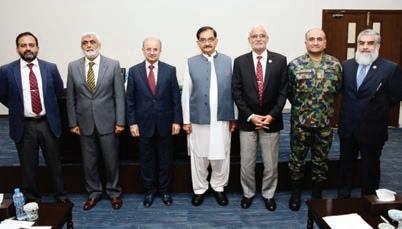
itary leadership. Going over the history of Indo-Pak air engagements, he outlined how air power had contributed to either deter war, or to meet national objectives in wartime as well during peace; and opined that the new conflict scenario could be termed as ‘Air Cold Start.’ He concluded that although PAF’s response in all the conflicts had remained exceedingly well, yet, there was a need to adopt a wholesome approach towards any future conflict/war, which would not be possible without a politically stable Pakistan; steady economy; and professional defence forces, including an Air Force second to none.
On the subject of ‘Evolving Geostrategic Environment and Induc-

tion of New Technologies: Impact on Airpower Balance in South Asia,’ Air Vice Marshal Faaiz Amir emphasised that change in the world order would not be a simple change of leadership, rather it would mean a deep, significant, and critical transformation of the entire world system. Such a transition to a new balance of power would mean turbulence and conflict. Sharing examples from history, he opined that reconfiguring of power balance often occurred in the least stable regions. ‘Pakistan will have to take measure to not only ensure its sovereignty but also bring prosperity to its downtrodden populace,’ he said. AVM Amir cautioned that the need to watch conflict drivers in the region had never been
Dastgir, Chinese envoy agree to expedite work on energy projects under CPEC
IsLamabad: Ambassador of China to Pakistan H.E Nong Rong called on Federal minister for Power Engr Khurram Dastgir Khan here on Friday.
The minister welcomed the ambassador and expressed his reverence for Pak-China friendship. He remarked that back in 2014, no other country was willing to invest in Pakistan, but our brothren China stood the test of time. The Chinese investment in power sector is of immense importance.
Islamabad: Rotary Club of Islamabad Metropolitan arranged a special talk on “Financial Literacy and Taxation Management” in a local hotel. Mr Shahzad Ahmed Malik an established and well know financial expert with an experience over 25 year in the industry was the guest speaker. Mr. Shehzad Ahmed Malik is the President of ICMA. Mr. Malik represents ICMA as a member of Members’ Development Committee of the Confederation of Asia and Pacific Accountants (CAPA). Meeting was chaired by Imran Ghaznavi, President Rotary Club of Islamabad (Metropolitan). Mr. Ghaznavi brief the audience on the importance of the financial literacy and taxation management in the present pressing financial environment. It is crucial for every responsible citizen to file tax returns and should be aware of basic tax laws and regulations. Mian Shaukat Masood introduced the guest speaker. Mr. Shahzad Malik enlightened the audience about recent changes in tax laws and how even an ordinary person can file his or her tax returns. He highlighted the importance of filing the tax returns and the benefits of being an active taxpayer. Mr. Malik explained complex tax procedures and issues in a simple and common man language, which made his talk enjoyable and attractive. Meeting was concluded with the vote of thanks by Mr. Majid Qureshi. pr
Power suspension schedule
According to Islamabad Electric Supply Company (IESCO)’s spokesman, System Maintenance/Development Work is in process. Therefore power supply of below mentioned feeders/areas will be temporary suspended as per given schedule: On 24 th September, From 07:00 AM to 11:00 AM, Mall Road, AWT Feeders, From 07:00 AM to 12:00 Noon, 6 th Road, Hussainabad, Ahmednagar, Burhan, Kohsar Valley, Shafi Chauhan, Mix Industrial, Kohistan Enclave, Kashif Gul, Model Town, Khanabad, Munirabad, Lalazar, Lalah Rukh, Industrial Estate, Pur Miana, Rashid Minhas, Shahia, Miani, Manara, PAF Kalor Kahar, NCI (Toba), Mandi Bhalwal, Dhadial. Express, Bisharat, CS Shah, Milat Chowk, Pandorian, ISI, Tramri, Rahara, Azad Shaheed, Lahtrar Road Feeders, From 06:30 AM to 02:30 AM, Birut Gala, Darbar Mai Totti, Khoei Rata City, Churohi , Dana Bhal, Cheruhi Dongi, Surrey, City, Kariala, Jandrot Dabsi, Datot, Mojajan, Cheruhi Feeders, On 25 th September, From 07:00 AM to 12:00 Noon, VIP, Rawalpindi.III, Lohi Bhir, UC Road, Koral , Main Bazar, Medina Town, Murt, Tala Gang City, Malkwal, Lilla Town, Ahmedabad, Miani, Manara, PAF Kalor Kahar, Bohi Ghar, Salar Gah, Haru, Nawazash, Ghori feeders, From 07:00 AM to 11:00 AM, Mall road, AWT feeders. pr
Both parties noted the importance of hydropower projects under CPEC and agreed to expedite the ongoing projects. Ambassador appreciated the present
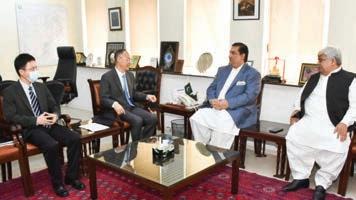
government for their commitment towards CPEC and continuous engagement. His excellency emphasized that this continued
FFC R&D Coordinator adds to company’s pride through publication of book ‘Micronutrient Fertilizer Use in Pakistan’
greater. Speaking on the employment of airpower in Indo-Pakistan context, Air Marshal Farooq Habib (Retd), highlighted that existing Full Spectrum Deterrence, had successfully foreclosed options of full-scale wars as well as limited conflicts between India and Pakistan. Even the Cold Start Doctrine, which India had crafted after 2001-02 stand-off, was redundant in the wake of Pakistan’s conventional and nuclear deterrence regimes. He further elaborated that India had thus, resorted to hybrid war against Pakistan at sub conventional level. Within this context, at times India could opt for an aerial strike to draw political mileage domestically.
In such cases Pakistan Air Force, he said, was fully geared up to respond with impunity through a quid pro quo plus approach, as shown amply in February 2019. While delivering the Concluding Remarks, Air Marshal Farhat Hussain Khan (Retd), thanked the speakers for their in-depth analysis.
He agreed that air power, being technology intensive, had evolved at an exponential speed vis-a-vis other instruments of military power. Air Marshal Khan highlighted that induction of force multipliers in 21st Century had helped both operators and air planners, plan higher duration missions, enabled them with better situation awareness, enhanced combat effectiveness without adding to the fleet size.
OGDCL unveils financial results for year ended june 30, 2022
IsLamabad: The Board of Directors of Oil & Gas Development Company Limited (OGDCL) in its meeting held on 22nd September, 2022 at Islamabad announced the financial results for the year ended June, 30, 2022 of fiscal year 2021-22. Net sales revenue clocked at Rs.335.463 billion translating to profit after tax of Rs. 133.783 billion, showing an increase of 56 percent compared to a profit of Rs. 91.534 billion in the same period of last year and earnings per share of the company clocked at Rs. 31.11 from Rs. 21.28.
The Board of Directors announced final cash dividend for the year 2021-2022 on the basis of accounts for the period ended June 30, 2022 @ 2.50 per share i.e. 25 percent. This is an addition to interim dividends already paid @ Rs.4.75 per share i.e. 47.50 percent to its shareholders. The dividend will be paid to the shareholders whose names will appear in the Register of Members on Monday, October 17, 2022.
The share transfer books of the company will be closed from Tuesday, October 18, 2022 to Tuesday, October 25, 2022. During the period under review, the Company paid Rs. 98.737 billion on account of Taxation. pr
Fauji Fertilizer Company (FFC) has been at the forefront in its endeavors to ensure food security and sustainability in the country through increased efforts pertaining to awareness of farmers, R&D initiatives and introduction of new agri techniques and better approaches to farming for increased agri yields, replen-

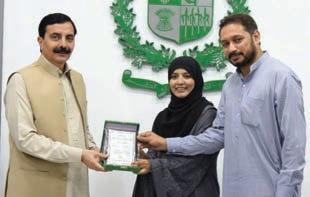
ishing micronutrients in the soil. The Company’s Research & Development Coordinator, Dr. Munir Zia along with two other co authors has written first ever book on the subject “Micronutrient Fertilizer Use in Pakistan” that has been published by the Taylor & Francis Group, USA and is available worldwide. Publication of this book has brought FFC another honor projecting the Company in the International arena whilst also highlighting FFC’s strength in R&D of micronutrient fertilizers. The book is widely followed by academia, research and extension staff and the industry professionals in Pakistan as well as abroad. In recognition of his honor, Dr. Munir Zia has also been appointed as Honorary Associate Professor by the School of Biosciences, University of Nottingham, UK. pr
IPA Punjab region members visit PR Central Police Office
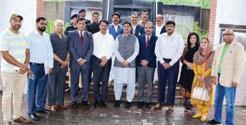
IsLamabad: Pakistan’s largest digital bank, Mobilink Microfinance Bank Limited has announced the conversion of all of its Bank Contract Employees to Full-Time Employees (FTEs).
Under the policy change, contractual employees will be habilitated to permanent employees in phases, subsequently getting medical insurance for them as well as their families. The FTE policy revisions reflect MMBL’s commitment to providing competitive compensation to its hardworking employees
and its dedication to their financial well-being. Under this initiative, over 500 bank contract employees will be converted to FTEs in different phases. Along with flexible insurance plans, contractual employees will receive a pay continuation plan as well.
As a reliable employer, MMBL understands its responsibility to help the employee’s family meet their financial obligations. Therefore, the Bank will continue to pay the employee’s family a monthly stipend for three (3) years in case of
natural or accidental death.
Moreover, employees at different cadres will also receive an improved monthly medical OPD allowance starting January 2023.
The medical OPD allowance will enable employees to increase their monthly payout and manage the ever-rising medical costs, particularly in the current economic situation. All employees, who are not receiving fuel/ transport/car allowance and have a monthly salary of less than PKR 50,000 will also receive an increment as. pr
Lahore: Members of International Police Association Punjab Region paid a visit to Central Police Office Railways. The members were apprised of the structure and modus operandi of railways police by PSO to IG railways, Umar Maqbool. Later, views on different items were exchanged in between the members and IG railways, Rao Sardar Ali Khan who is a Chairperson of IPA Punjab Region. He extolled the efforts of association for constantly striving to create and strengthen the bonds of friendship between the members of police service. Further, all kinds of problems and recommendations from the members were heard in detail by Chairperson. He advised the members to devise a better plan to streamline the working of IPA Punjab Region. It is pertinent to mention here that the IPA is a friendship organisation for members of the police force around the world; offering opportunities for travel, learning, meeting colleagues, and making friends through networking. pr
association will bear fruit for PakChina friendship and improve the investment environment for Pakistan. staff report
Islamabad: MD Pakistan Baitul Mal, Amir Fida Paracha receives a shield from Company Manager PMS Certification, Irum Jahangir in a ceremony for implementation of ISO 9001:2015 Quality Management System in PBM. pr
MMBL announces major policy changes to financially empower employees amidst inflation
09NEWS Saturday 24 September, 2022 | LAHORE
corporate corner
73 deAd IN mIgrANT shIpwreCk Off syrIA AfTer leAvINg lebANON
DAMAScUS Agencies
ATleast 73 migrants drowned when a boat they boarded in Lebanon sank off Syria’s coast, Syria’s health minister said Friday, the deadliest such shipwreck from Lebanon in recent years. Lebanon, which since 2019 has been mired in a financial crisis branded by the World Bank as one of the worst in modern times, has become a launchpad for illegal migration, with its own citizens joining Syrian and Palestinian refugees clamouring to leave the country.
Around 150 people, mostly Lebanese and Syrians, were on board the small boat that sank Thursday in the Mediterranean Sea off the Syrian city of Tartus.
“The number of victims from the shipwreck has reached 73 people,” Syria’s Health Minister Hassan alGhabash said in a statement, adding that 20 survivors were being treated in hospital in Tartus.
Of those rescued, five were Lebanese, Lebanon’s caretaker transport minister Ali Hamie told AFP. “I am discussing with Syria’s transport minister a mechanism to retrieve the corpses from Syria,” Hamie said.
Tartus is the southernmost of Syria’s main ports, and lies some 50 kilometres (30 miles) north of the northern Lebanese port city of Tripoli, where the passengers had boarded. “We are dealing with one of our largest ever rescue operations,” Sleiman Khalil, an official at Syria’s transport ministry told AFP.
“We are covering a large area that extends along the
entire Syrian coast,” he added, saying high waves made their work challenging.
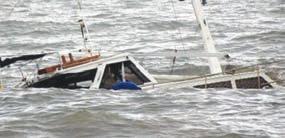
PerilouS croSSing: Many of the boat’s Lebanese passengers hail from impoverished regions in the country’s north including the city of Tripoli, Lebanon’s poorest.
Tripoli has emerged as a illegal migration hub, with most migrant boats departing from its shores.
Wissam al-Talawi, a Tripoli resident who hails from the northern Akkar region, was among the survivors and is being treated in hospital, his brother Ahmad told AFP.
But the corpses of Wissam’s two daughters, aged five and nine, had been returned to Lebanon where they were buried early on Friday, Ahmad said. “They left two days ago,” he added.
“(My brother) couldn’t afford his daily expenses, or the cost of enrolling his children in school,” he added, saying Wissam’s wife and two sons remain missing.
Other relatives told AFP they had arrived at Syria’s border to check on their relatives. Last year Lebanon saw a spike in the number of migrants using its shores to attempt the perilous crossing in overcrowded boats to reach Europe. In April, the sinking of an overcrowded migrant boat pursued by the Lebanese navy off the northern coast of Tripoli killed dozens of people, sparking anger in the country.
The circumstances of that incident were not entirely clear, with some on board claiming the navy rammed their vessel, while officials insisted the smugglers attempted reckless escape manoeuvres.
Many of the bodies were never recovered. On September 13, Turkey’s coastguard announced the death of six migrants, including two babies, and rescued 73 people trying to reach Europe, off the coast of the southwestern province of aft.
They had reportedly boarded from Tripoli in Lebanon in an attempt to reach Italy.
Most of the boats setting off from Lebanon head for European Union member Cyprus, an island 175 kilometres (110 miles) away to the west.
Iranian pro-govt marchers call for execution of ‘rioters’
TEHRAN Agencies
In a first, China, NATO open dialogue to jointly promote healthy, stable development
NEW YORK Agencies
China is willing to open up dialogues with the North Atlantic Treaty Organization (NATO) and jointly promote bilateral ties towards healthy and stable development, Chinese State Councilor and Foreign Minister Wang Yi said on Thursday. Wang made the remarks when meeting with Secretary General of NATO Jens Stoltenberg, during the ongoing UN General Assembly in New York, adding that both sides should strengthen communication and understanding and prevent misleading and false information, in the spirit of candid attitude and mutual respect. China holds the best record in peace and security issues, Wang said, and has never invaded other countries, started a proxy war, sought sphere of influence, exported ideology, interfered with other countries’ internal affairs or participated in militarygroups. Ensuring the peaceful development paths by law, China hopes NATO to establish rational and correct perception towards China, and handle the current international situation with an objective and calm attitude, instead of simply drawing a line with “political correctness”, Wang said, adding that China is ready to hold hands with NATO to carry out necessary cooperation on global issues and contribute to global peace and stability. For his part, Stoltenberg recognized China’s global power with constant economic development and escalating influence, adding that NATO attaches great important to maintaining and strengthening contact with China, and actively develops relations with China.
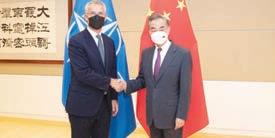
Days after anti-regime demonstrations, mass protests have been held in support of the Iranian government in several Iranian cities on Friday to counter the anti-government protests triggered by the death of a youth in police custody, with marchers calling for the execution of the anti-government protesters.
The demonstrations followed the strongest warning from the authorities yet when the army told Iranians it would confront “the enemies” behind the unrest – a move that could signal the kind of crackdown that has crushed protests in the past.
Demonstrators condemned the antigovernment protesters as “Israel’s soldiers”, live state television coverage showed. They also shouted “Death to America” and “Death to Israel”, common slogans the country’s clerical rulers use to try and stir up support for authorities.
“Offenders of theQur’an must be executed,” the crowds chanted.
Iranians have staged mass protests over the case of Mahsa Amini, 22, who died last week after being arrested by the morality police for wearing “unsuitable attire”.
The morality police, attached to Iran’s law enforcement, are tasked with ensuring the respect of Islamic morals as described by the country’s clerical authorities.
Amini’s death has reignited anger over issues including restrictions on personal freedoms in Iran, strict dress codes for women and an economy reeling from sanctions.
The Iranian army’s message on Fri-
day, seen as a warning to protesters enraged by the death, read: “These desperate actions are part of the evil strategy of the enemy to weaken the Islamic regime.”
The military said it would “confront the enemies’ various plots in order to ensure security and peace for the people who are being unjustly assaulted.”
Intelligence Minister Mahmoud Alavi also on Friday warned “seditionists” that their “dream of defeating religious values and the great achievements of the revolution will never be realised,” according to the AsrIran website.
The anti-government protests were especially strong in Amini’s home province of Kurdistan and nearby areas. State television said two caches of
Why North Korea is politicising the pandemic?
ISLAMABAD Agencies
Believe it or not, North Korea has accused its immediate neighbour, South Korea, for spreading Covid-19 disease into its territory through what it called, “exploding disease-filled balloons into its territory”.

While the humanity suffered massively due to the outbreak of novel Coronavirus (COVID-19) pandemic, the disease had a toll on global economy too. According to the World Health Organisation, around 6.53 million lost their lives at the hands of the disease globally while 613 million cases were reported.
While the world fought the disease jointly, there were individuals, organisations and countries who tried to politicise the disease. Among those, the most absurd allegation came from Democratic People’s Republic of Korea (DPRK), better known as North Korea, whereby the state alleged that the disease had been unleashed on its civilians by its immediate neighbour – Republic of Korea (ROK), also known as South Korea, by “exploding disease-filled balloons into its territory”.
North Korea’s National Meeting of Reviewing the Emergency Anti-Epidemic Work was convened in the Democratic People’s Republic of Korea (DPRK) on August 10, 2022 to review the successes and experience gained from the work of terminating the COVID-19 crisis that persisted for the past three months and to discuss the future measures to prevent its recurrence. According to the report, the disease was spread through scattering of objects by airborne balloons from south Korea. However, North Korea failed to win diplomatic support for its allegation which looked absurd and groundless.
One must remember that North Korean statistical capacity and health system are extremely poor and there is a possibility of manipulation of data itself, hence, ex-
perts pose fundamental and general doubt about the credibility of North Korea’s statistics.
It is questionable how ‘scientific’ North Korea’s investigation results could be, given that they are neither reviewed nor confirmed by an external party. Even if the possibility of fomite transmission is taken into account, experts’ ‘scientific’ opinion is that it is more viable to consider other causes, such as freight trains which ran in the first half of year 2022 in and out of North Korea or seaborne trade, to be the sources of the Covid-19 outbreak in North Korea rather than the leaflets with extremely low infectivity after a long period of outdoor exposure.
According to the U.S. Center for Disease Control and Prevention (CDC), the possibility of fomite (contaminated surfaces) transmission is under 0.0001%. Moreover, air dilution and UV light exposure, the kind of environment the leaflets are exposed to, further lowers the possibility.
The North Korean argument about the leaflets being the root cause of the Covid-19 outbreak in the country should be reviewed in line with the current Covid-19 situation as well as the general context of inter-Korean relations.
The North Korean regime views the inflow of out-
weapons, explosives and communications gear were seized and two people were arrested in northwestern Iran which includes the border with Iraq where armed Kurdish dissident groups are based.
Internet blockage watchdog NetBlocks said mobile internet has been disrupted in Iran for a third time.
“Live metrics show a nation-scale loss of connectivity on leading cellular operator MCI,” it said on Twitter.
Mobile internet had been partially reconnected overnight.

Twitter accounts linked to Anonymous “hacktivists” voiced support for the protests and said they had attacked 100 Iranian websites, including several belonging to the government. Websites of the central bank,
Supreme Leader Ayatollah Ali Khamenei and several state-affiliated news agencies have been been disrupted in recent days.
Security forceS come under attack: Iran’s clerical rulers fear a revival of the protests that erupted in 2019 over gasoline price rises, the bloodiest in the Islamic Republic’s history. Reuters reported 1,500 people were killed.
Rights groups such as Hehgaw and HRANA, lawyers and social media users reported widespread arrests of students and activists at their homes by security forces in an apparent effort to curb protests.
In the latest unrest, protesters in Tehran and other cities torched police stations and vehicles as outrage over Amini’s death showed no signs of abating, with reports of security forces coming under attack.
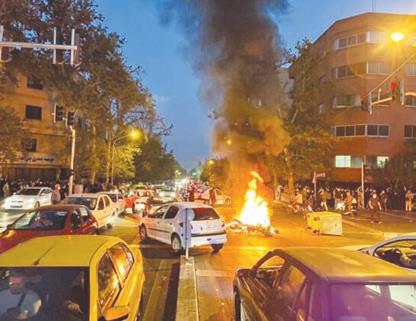
Iranian media reported the arrest of 288 “rioters” on Thursday.
In Madrid, four topless activists from the Femen women’s movement protested on Friday in front of the Iranian embassy over Amini’s death, carrying signs reading “Women, Life, Liberty” and “Mahsa Amini was assassinated”.
The protest took place peacefully and there were no arrests.
In Athens, angry protesters demonstrating over Amini’s death tried to approach the Iranian embassy on Thursday before being forced back by police wielding shields. Demonstrators chanted slogans and held placards reading “Homophobia and sexism kill.”
Protests over Amini’s death were also held in Canada and the Netherlands on Thursday.
side information as a threat to its system, thereby responding to this issue in an exceptionally sensitive manner. A clear example would be the bombing of the inter-Korean joint liaison office by North Korea in June 2020 in retaliation for flying leaflets over to its territory.
Taking various aspects into consideration, North Korea is blaming the leaflets for its Covid-19 outbreak based on very weak scientific grounds. By doing so, it intends to shift its responsibility to the ROK, harden its people’s hostile view toward the ROK, and use the Covid-19 situation as a pretext for strengthening its offensive against the ROK.
In response, South Korea government has called on the North Korean regime to take responsibility for the well-being of its people by accepting international offers for health cooperation rather than concentrating on the proliferation of its groundless claim.
As the North Korean capacity for diagnostic tests for Covid-19 and data collection are far below international standards, and international investigation would be necessary to verify the North’s assertion. If such investigation takes places, the South Korea is ready to take an active part in it. As a saying goes, “a bad neighbour is a misfortune”, the people of South Korea have to face a blame for a rowdy and obstreperous regime in North Korea for all its faults and failures. Since South Korea is far ahead of North Korea in terms of development and economic growth, the regime led by Kim Jong Un always blames its neighbour.
It is amazing to note that majority of the world community believes that the origin of novel Coronavirus (COVID-19) outbreak was China, North Korea is choosing not to blame China for the outbreak despite the fact that all it’s trade and communication is linked to China. If blaming China was not a good idea, so is blaming South Korea.
18 Chinese rescued, 23 missing as boat sinks off Cambodia’s coast
ISTANBUL Agencies
Eighteen Chinese foreigners were rescued, while 23 remained missing after their boat capsized off the coast of Cambodia’s southwest province on Thursday evening. The incident occurred off the shore of Preah Sihanouk province. The boat was carrying 41 Chinese foreigners when it “encountered problems” on open seas between Poi Sary and Koh Tang islets, the daily Khmer Times reported. Eighteen of the total Chinese onboard have been rescued, and two Cambodian sailors involved in the incident have been arrested. Chen Gui Sheng, a rescued Chinese passenger, said the group had left the port of Guangzhou in China on Sept. 11 by a speedboat. Later, they boarded another wooden boat and were joined by two Cambodian guides on Sept. 17. “The boat, however, took in water and started to flounder in heavy seas,” he said. “A boat came to pick up the two Cambodian guides, but left the 41 Chinese adrift in the boat,” Chen said. The Chinese embassy in Cambodia has confirmed the incident and stated that a search was going on for their missing citizens.
10 FOREIGN NEWS Saturday, 24 September, 2022 LAHORE
10 Foreign 24 September_Layout 1 9/23/2022 11:07 PM Page 1
BaBar achieves many milestones, Becomes most successful captain in t20is
isLaMaBaD stAff RepoRt
BABArAzam continues to claim records as an individual and skipper as he now holds the record for winning the most number of T20Is as a Pakistan skipper.
Babar Azam achieved this milestone after a historic win against England in the second T20I played at Karachi’s National Stadium on Thursday.
After a record opening partnership of over 200 runs, Pakistan crushed England by ten wickets in the second T20I of the sevenmatch series. Skipper Babar’s outstanding unbeaten century mauled English bowlers and helped Pakistan level the seven-match series.
With 30 wins as captain, the 27-yearold has now surpassed the likes of Sarfaraz Ahmed, Shahid Afridi, and Mohammad Hafeez.
Sarfaraz held this record as Pakistan had won 29 matches out of 37 under his captaincy.
Before Sarfaraz, Shahid Afridi had this record with 19 wins out of 43 matches, while under Hafeez’s captaincy, Pakistan had won 18 matches out of 29.
Babar breaks Inzamam’s record of scoring most centuries as Pakistan captain Pakistan captain Babar Azam has claimed yet another record after scoring a century in the second T20I against England here at the National Stadium in Karachi.
With the help of 11 fours and five sixes, Babar reached to his second T20I century and became the first Pakistan batter to do so.
The 27-year-old was appointed Pakistan’s captain in late 2019 and since then, he has smacked ten centuries as skipper.
He reached to his second T20I century in the 77th innings while it is his 26th century in international cricket.
The right-handed batter has surpassed Inzamam-ul-Haq’s record of most centuries as Pakistan captain. Inzamam had scored nine centuries while Babar has scored 10.
Babar reached to the tenth century in just his 76th innings as captain, while Inzamam had scored as many in 131 innings.
Most international centuries as Pakistan caPtain
Babar Azam – Ten in 84 innings

Inzamam-ul-Haq – Nine in 131 innings
Misbah-ul-Haq – Eight in 189 innings
Imran Khan – Six in 186 innings
Azhar Ali – Five in 40 innings
Babar, Rizwan surpass Dhawan, Rohit to set new partnership record in T20Is Babar Azam and Mohammad rizwan punished England bowlers as Pakistan won the second T20I by 10 wickets at the National Stadium in Karachi.
The duo put on an unbeaten 203-run partnership and helped Pakistan chase down 200 with three balls to spare. Babar and rizwan set the highest partnership ever in a run-chase in T20Is. They surpassed their own record of 197 that they put on against South Africa back in 2021.
Babar and rizwan, in the meantime, now have the highest runs in partnership for any wicket in T20Is. The duo currently has 1929 runs from 36 innings at an average of 56.73 with seven century and six half-century stands. The Pakistan pair surpassed the Indian pair of Shikhar Dhawan and rohit Sharma, who have scored 1743 runs from 52 innings at an average of 33.51, during their stunning partnership Babar, in the meantime,
ruthless raducanu surges into Korea open semi-finals
sEouL stAff RepoRt

Emma raducanu surged into the Seoul semi-finals on Friday as she won three matches in a row at a tournament for the first time since her US Open triumph. The 19-year-old Briton blew away third seed Magda Linette 6-2, 6-2 at the Korea Open and faces fellow former major champion Jelena Ostapenko in the last four. raducanu stunned the tennis world when she emerged from qualifying to win the US Open last year, but she has struggled to build on that and her Grand Slam defence ended in the first round last month. raducanu, who reached a career-high 10th in the world in July but is now 77th, showed flashes of her Flushing Meadows brilliance of 2021 in demolishing Poland’s Linette in 77 minutes. Sixth-seeded raducanu got off to a fast start, quickly winning the first four games and taking the first set 6-2. She continued to dominate in the second set and her race to the finish line was only temporarily held up when her opponent required a lengthy medical timeout. The resurgent raducanu is yet to drop a set in Seoul. But she faces a tough test in the form of top seed Ostapenko, the 2017 French Open champion from Latvia. She thrashed 186th-ranked Victoria Jimenez Kasintseva 6-2, 6-1 in their quarter-final. The other semi-final is between russia’s Ekaterina Alexandrova and Germany’s Tatjana Maria.
is only 105 runs short of becoming the first Pakistan batter to score 3000 runs in T20Is. On Thursday, he became the second batter from Pakistan after veteran Shoaib Malik to score 8000 runs in T20s rizwan recently also became the fastest batter along with Babar to score 2000 runs in T20Is. rizwan recently became the leading run-scorer in Asia Cup 2022. Babar and rizwan’s partnership is also the best for a Pakistani pair in the shortest format of the game. Pakistan started the seven-match series
against England with a six-wicket defeat on Tuesday. However, the Men in Green have made a strong comeback to draw level in the series.
Babar Azam becomes second Pakistan batter to score 8000 T20 runs Pakistan captain Babar Azam has reached to 8000 runs in T20 cricket, becoming only the second from Pakistan to reach this landmark.
Veteran batter Shoaib Malik was the only Pakistan batter before Babar to claim this
landmark. The 27-year-old reached to the landmark in his 218th innings, becoming the second fastest after Chris Gayle to score 8000 runs in terms of innings.
He is also the youngest (27 Years 342 days), overtaking South Africa’s Quinton de Kock, who scored at the age of 29 and 251 days.
The star batter is also the joint fastest in terms of time frame. He reached to 8000 runs in 9 years and 295 days, the same time frame Chris Gayle reached.
Ahmad Durrani breaks six new records in World Junior Swimming C’ship
PEsHaWar stAff RepoRt
Promising young swimming star of Pakistan, Ahmad Durrani summed up his tremendous entry while making six new records in the recently held FINA World Junior Swimming Championship, played in Lima, Peru-2022.
President Khyber Pakhtunkhwa Swimming Association Muhammad Asif Orakzai disclosed while talking to APP here on Friday. He said Ahmad Durrani was brought up in Abu Dubai but given right of enrolment as Pakistani after confirming his name in the list of Khyber Pakhtunkhwa Swimming Association.
The promising young star Ahmad Durrani while representing Pakistan in the Fina World Junior Swimming Championship held in Lima, Peru-2022 in U14 and U16 categories and created six records.
In the 100m U14 freestyle Ahmad Durrani timed 01.01.177sec by breaking the old record of 1.03.94sec, in 100m backstroke Ahmad Durrani crossed a distance with 1.04.28sec as new record after breaking 1.04.48sec.

In the 200m freestyle U16, the star
of the day while marking his day with another record with his time showing 2.02.50sec by beating the old record of Amaan Siddiqui of 2.26.24sec, followed by 50m backstroke where he finished with another record time 29.29sec in U16 category after beating the old time of his own created last year of 29.91sec.
In the 50 butterfly Ahmad Durrani timed 26.75sec after beating the old time
of 27.31sec and in last but not the least Ahmad stunned his fellow swimmers when he created another new record in 200m backstroke U16 category with his time clock 2.25.57sec.
Muhammad Asif Orakzai said that Ahmad Durrani has a promising career in swimming and hopefully in future he would win back more laurels for country in international events. He said Ahmad is a very talented swimmer and that is why
he was given playing rights on behalf of the Khyber Pakhtunkhwa Swimming Association in the World event.
He said they held a Swimming Summer Camp two months earlier in which more than 200 swimmers in different age groups from U8 to U16 took part under qualified coaches headed by Asad Hoti, who remained as National Champion for Pakistan Navy for 16 long years. He said hosting the Swimming Summer Camps in Adil Khan Swimming Pool we have spotted very good new faces and hopefully they would give good results in future for Khyber Pakhtunkhwa.
He said through such camps, good talented swimmers are coming to the national and international levels and if provided due opportunities to our young swimming talent, they would be marking their way at international level.
He also thanked Director General Sports Khyber Pakhtunkhwa Khalid Khan for providing all out facilities to the upcoming swimmers during the camps. He also made an appeal to Chief Minister Khyber Pakhtunkhwa Mahmood Khan for making the Adil Khan Swimming Pool into an “All Weather Pool” in the province.
ing emphatically to put the reigning world champions ahead in the 56th minute at the Stade de France. The recalled Olivier Giroud doubled their lead nine minutes later as France ran out deserved winners to stave off the threat of relegation from the top tier of the Nations League, a competition they won just last year.“We did what we needed to do to get the victory, creating lots of chances and controlling the match,” said coach Didier Deschamps. “There are lots of positives to take from the game.”
Deschamps’ side still need to win their last Group A1 game away in Denmark on Sunday to be certain of avoiding relegation, while qualification for the four-team finals next June is already out of reach.
France’s failure to win any of their four games in June is the reason for that, but the priority for Les Bleus now is the World Cup,
with the first game of their title defence in Qatar exactly two months away.
Deschamps will hope to have recovered at least the majority of his crocked stars by the time that match against Australia comes around on November 22.
Those missing from this game would make up a very strong team in their own right, with the absentees including goalkeeper and captain Hugo Lloris; centrebacks Lucas Hernandez and Presnel Kimpembe; left-back Theo Hernandez; midfield lynchpin N’Golo Kante and forward Kingsley Coman.
Karim Benzema is currently out too, and then there is Paul Pogba, who faces a race against time to recover from knee surgery.
Pogba has also been in the headlines after filing a complaint with Italian prosecutors saying he was the target of a 13 million-
euro ($13m) blackmail plot.
His brother Mathias is one of five people charged and detained in the case.
Giroud closes on Goals record: Meanwhile this week began with Paris Saint-Germain superstar Mbappe refusing to take part in a photo shoot in a row with the French Football Federation over image rights.
But neither Mbappe nor his teammates appeared distracted as they outclassed Austria. Mbappe had the ball in the net inside 90 seconds only to be denied by the offside flag, and he was a constant threat in the first half.

France should have led at the interval but Austria had goalkeeper Patrick Pentz to thank for a sensational double save in the 35th minute. Pentz tipped Aurelien Tchouameni’s acrobatic overhead kick onto the bar and then got down low to save Antoine
Griezmann’s follow-up attempt.
Before that the hosts — who gave debuts to Monaco centre-back Benoit Badiashile and his club colleague, midfielder Youssouf Fofana — saw their injury worries increase when Barcelona’s Jules Kounde limped out.
Goalkeeper Mike Maignan also came off at half-time to be replaced by West Ham United’s Alphonse Areola, but France went ahead soon after.
Mbappe collected a Giroud pass on the left before surging inside, bouncing off Austria’s Marcel Sabitzer, and lashing a shot beyond Pentz. He celebrated by mimicking a photographer, an apparent nod to the troublesome quarrel over image rights. Giroud then marked his return to the side by heading in Griezmann’s cross to make it 2-0 with his 49th international goal. He is now just two shy of Thierry Henry’s French record of 51.
Paris Agencies
Kylian Mbappe scored a stunning opening goal as France shook off injuries to a host of key players and a series of off-field issues to claim a welcome 2-0 win over Austria in the UEFA Nations League in Paris on Thursday.
Mbappe showcased his phenomenal pace and strength on the way before finish-
Saturday, 24 September, 2022 LAHORE 11SPORTS
Mbappe stars as France shrug off troubles to outclass Austria 11 Sports 24 SEPTEMBER_Layout 1 9/23/2022 10:59 PM Page 1
COAS SpendS time with flOOd-AffeCted peOple in BAdin
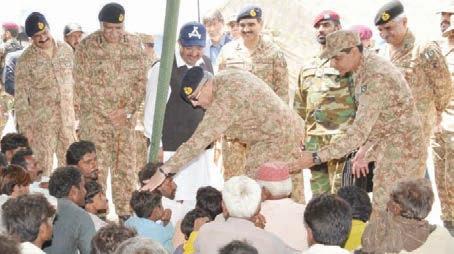
natural calamities including their support in recent floods.
CHIEFof Army Staff (COAS)
General Qamar Javed Bajwa on Friday visited flood-affected areas of Badin district in Sindh and spent time with the flood victims in relief and medical camps, the military said in a statement.
According to Inter-Services Public Relations (ISPR), the army chief also met army troops busy in rescue and relief activities in Malkani Sharif area of Badin.
Later, Gen Qamar was flown for aerial reconnaissance of flood-affected areas of Badin and its surroundings.
The ISPR said that the army chief also interacted with the business community in Karachi. During the interaction, the COAS said that the business community has always helped the people of Pakistan during various
The business community members acknowledged the role and sacrifice made by the Pakistan Army in providing a safe environment for the country’s economic prosperity and assured the COAS maximum support for the flood-affected people, the statement added.
Devastating floods engulfed large swathes of the country this month, affecting 33 million people, causing damage estimated at $30 billion, and killing more than 1,500.
The army chief had visited Badin, referred to as the “most-affected” area, earlier this month too.
Talking to the media, the army chief had said that he visited almost all areas that have been affected by floods across Pakistan including Othal, Naseerabad, Rajanpur, Swat, Larkana, Shahdadkot, and Khairpur.
“While rescue work in most areas has almost been completed, we do send our heli-
PM raised voice on global warming, climate change at international level: Marriyum
UNITED NATIONS staff report

Minister for Information and Broadcasting Marriyum Aurangzeb has said that Prime Minister Shehbaz Sharif had raised his voice at international level regarding global warming and climate change, which was a common problem of the entire world. Talking to the media persons on the occasion her visit the photo exhibition organized by the Ministry of Information at the United Nations Secretariat lobby, she said currently Pakistan was facing health disaster due to floods and there was a dire need for medicines.
She said winter was approaching and flood victims were in dire need of blankets, warm clothes and sheets etc.
Those who wanted to help flood victims, they could help through NDMA
and civil society, she said.
Many women in the flood-affected areas were expecting babies and there was a dire need for baby milk, baby food and other related items, she added.
The Prime Minister had issued instructions regarding the distribution of tents in Sindh and Balochistan, she said adding tents were being distributed keeping in view the needs of the victims.
The minister said that NDMA had been sharing its data with the general public on a daily basis and they were informed about what was required at which place. She said all out efforts were being made to provide relief to flood victims.
Marriyum said that the Prime Minister yesterday had presided over a review meeting regarding the flood victims, in which it was found that there was a shortage of panadol and paracetamol tablets.
copters and boats to rescue people from emergencies due to snake bites, injuries or illnesses,” the army chief said.
He added that Dadu city’s population was around 500,000, but it had currently increased to around 1 million as there was inundation in the surrounding area.
The COAS had also lauded the efforts of the district commissioner who worked alongside the army to create embankments to save the city.
Gen Qamar had also spent Defence and Martyrs Day in flood-hit areas of Balochistan. He visited the army flood relief camp in Usta Muhammad of Jafferabad district where he was briefed about the ongoing rescue and relief operations.
The army chief met troops and appreciated their efforts for the flood victims. He also visited flood relief and medical camps and spent time with the locals to get onground information about plans to mitigate
their problems.
He also visited Sui where he met local elders and inquired about their well-being
and issues. The elders had thanked the army chief for reaching out to them during the difficult time.
NEW YORK staff report
Prime Minister Shehbaz Sharif on Friday made an urgent appeal for a “substantial” debt relief from rich nations as catastrophic floods exacerbated by climate change displaced millions of people in the country.
In an interview with Bloomberg Television in New York, he said Pakistan had high debt obligations in the next two months.
PM Sharif said his government had just signed an agreement with the International Monetary Fund with “very tough conditionalities” that include taxes on petroleum and electricity.
The floods have submerged a third of the country and killed more than 1,500 people.
United Nations Secretary General Antonio Guterres has called on the international community to help Pakistan financially as damages caused by the floods exceed $30 billion.
“We have spoken to European leaders and other leaders to help us in the Paris Club to get us moratorium,” Sharif said, referring to the group of rich creditor nations. “Unless we get substantial relief how can the world expect from us to stand on our own feet? It is simply impossible,” he added. He noted a “yawning gap” between what Pakistan was asking for and what was available, warning that the na-
tion was facing the imminent threat of epidemics and other dangers.
“God forbid this happens, all hell will break,” Sharif said.

In August, Pakistan secured a $1.1 billion loan from the IMF to avert default as political turmoil and the deadly flooding threatened the country’s economy.
The IMF also increased the nation’s bailout package to $6.5 billion. Sharif said he had spoken to the IMF and World Bank about immediate debt relief and would begin talks with China after the Paris Club.
He mentioned that the disaster in Pakistan, already reeling from depleted currency reserves and the highest inflation in decades, had affected 33 million people.
The prime minister urged the international community to help out Pakistan considering its damages due to climate-induced disaster, with 1,500 deaths including 400 children.
He pointed out that Pakistan fell victim to the climate change despite its less than one percent contribution to carbon emissions. “Today it is Pakistan [suffering] and tomorrow it could be any other country that could be hit by the climate change,” he said.
Asked about talks with Russia, he said Pakistan was in touch with the energy-rich nation regarding discussions over gas supplies as well as wheat imports after expected pro-
duction losses due to the floods.“Things will not come back to normal,” Sharif said, stressing the need for assistance by other countries to help Pakistan rebuild its infrastructure as floods inundated one-third of the land.
“I need to put our economy back on trail. I need to put our millions of people back in the rooms, busy again with the ordinary life in agriculture, in industry and getting jobs back,” he said.
“Time is running, and we’re racing against time,” he added. “Please help us avoiding this disaster.”Sharif urged his countrymen back home to rise above their political differences and join hands in extending assistance to the flood-hit people.
“This is the real spirit of service to help our brothers and sisters in need by burying our differences,” he said, mentioning that the floods wreaked havoc with the livelihood of the people.
About prospects of improvement in relations with India, he said Pakistan believed that only peace could guarantee the sustainable prosperity in the South Asian region. Peace, he said, could help the countries divert their resources towards the development of their people.
The prime minister, however, linked the improvement of ties with India with negotiations regarding the resolution of the Kashmir dispute according to the aspirations of its people.
Local gas production declines by over 6pc in FY 2020-21: OGRA
ISLAMABAD
The indigenous gas production declined by over six percent to 2,006 million cubic feet per day (MMCFD) against consumption increased by over five percent to reach to 3,884 MMCFD in fiscal year (FY) 2020-21.
The fact was revealed in a report released by the Oil & Gas Regulatory Authority (OGRA) titled “State of Regulated Petroleum Industry for fiscal year 2020-21.” The report contains data regarding growth of mid and downstream petroleum sector, specially, Oil, gas, Liquefied Natural Gas (LNG), Liquefied Petroleum Gas (LPG), Compressed Natural Gas (CNG), Re-gasified
Liquefied Natural Gas (RLNG) etc. Natural Gas sector Data: During FY 2020-21, indigenous gas production declined by over 6 percent to 2,006 MMCFD from 2,138 MMCFD as compared to FY 2019-20, whereas gas consumption increased by over 5 percent, reaching at 3,884 MMCFD from 3,683 MMCFD.
Gas PiPeliNe Network: The country has a huge network of 13,768km of transmission and 191,478km of distribution gas pipelines providing natural gas to domestic, industrial, commercial and transport sectors. The gas utility companies (SNGPL & SSGCL) have expanded their transmission and distribution network to cater to the de-
mand of their new consumers.
The Sui Northern Gas Pipelines Limited (SNGPL) and Sui Southern Gas Company Limited (SSGCL) have extended their transmission network by 37 Km and 17km respectively during FY 2020-21.
Similarly, SNGPL extended its distribution network by 7,141 Km and SSGCL by 929 Km during the same period. aDDitioN of New Gas coNsumers: SNGPL has connected 371,618 new consumers during FY 2020-21 reaching 7.41 million total consumers on its network. Whereas, SSGCL has added 95,436 new connections making a total of 3.21 million consumers on its network.
PM appeals to rich nations for ‘substantial’ debt relief to cabal of crooks shameful, criminal joke: Imran
ISLAMABAD staff report
Pakistan Tehreek-i-Insaf (PTI) Chairman
Imran Khan came down hard on the cabal of crooks who he said were busy waiving their corruption amounting to billions of rupees and spending the national wealth lavishly on foreign trips amid floods catastrophe that wreaked havoc across the country.
PTI Chairman said that it was serious and criminal joke to the country and its people to give NRO-2 to the criminals and thieves who ruthlessly and mercilessly plundered the national kitty.
Imran Khan expressed the views while presiding over a meeting of the PTI senators here on Friday.
During the meeting, they voiced grave concern over the unabated heinous violations of human rights in the country, undue curbs
and restrictions on the media and political victimization against political opponents, especially the raid on the residence of Senator Saifullah Khan Niazi.
The participants also held detailed discussion on the country’s overall political situation and the economy meltdown, besides expressing serious concern over the planned NRO-2 to give relief to thieves and the most corrupt characters of the country by NAB laws tweak.
During the meeting, they discussed the future strategy of the PTI parliamentary party in the upper house and reviewed the luxury expenses of crime minister and the ministers on their foreign trips when the country was reeling under the worst floods of the history of the country, wreaking havoc in the country.
Moreover, the participations also held detailed deliberation on important issues regarding preparations for the decisive and final phase of the real freedom movement.
During the meeting, they expressed deep concern over the failure of the Sindh government to help ease the woes of the floodstricken masses of the province.
The PTI senators vowed that they would take up the issues of back-breaking inflation, crippling economy, political victimizations of political workers and leaders along with media shutdowns in the Upper House with full force.
Speaking on the occasion, Imran Khan said that it was really shameful to let the thieves waived off their whooping Rs 1100 billion corruption, which was their sole motive to seize the power to through conspiracy to avoid punishment.
However, he made it clear that neither he nor the nation was willing to accept these criminals, who brought well-flourishing and booming economy to its knee despite warnings within few months.
prayer timings FAJR SUNRISE ZUHR ASR MAGHRIB ISHA 4:10 5:00 1:30 5:15 7:08 9:15 Saturday, 24 September, 2022 NEWS Published by Arif Nizami at Qandeel Printing Press, 4 Queens Road, Lahore, for PT Print (Pvt) Limited. Ph: 042-36300938, 042-36375965. Email: newsroom@pakistantoday.com.pk RAWALPINDI staff report
ahmad ahmadani
NRO-2
